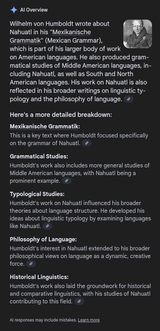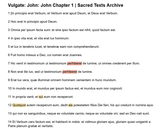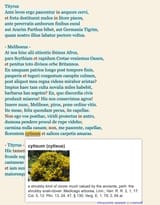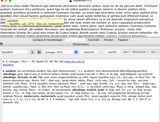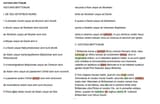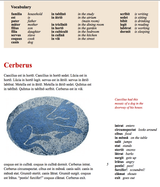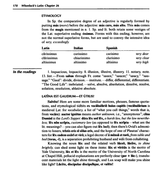/clg/ - Classical Languages General
Antiochian edition
>τὸ πρότερον νῆμα·
>>24632352
>Μέγα τὸ Ἑλληνιστί/Ῥωμαϊστί·
https://mega dot nz/folder/FHdXFZ4A#mWgaKv4SeG-2Rx7iMZ6EKw
>Mέγα τὸ ANE·
https://mega dot nz/folder/YfsmFRxA#pz58Q6aTDkwn9Ot6G68NRg
>Work in progress FAQ
https://rentry dot co/n8nrko
All Classical languages are welcome.
Here Mark Passio says one of Caesar's books contains a story about Caesar lambasting a centurion for teaching a slave their method of learning, which he says is the Trivium. I'm trying to find this story. It seems the book he's talking about is Commentarii de Bello Gallico. I asked AI about it but it says there is no such story in that book. Is Mark lying? Does anyone know of such a story in any of Caesar's books? Did anyone read Commentarii de Bello Gallico?
https://youtu.be/uj08lQ1qfAI
Anonymous
8/17/2025, 4:13:34 AM
No.24643918
[Report]
>>24643929
>>24643801
no one reads DBG here. We only discuss textbooks.
Anonymous
8/17/2025, 4:19:37 AM
No.24643925
[Report]
>>24643941
>>24643801
I can't say with absolute certainty, but it sounds like BS to me. He certainly didn't use the word "trivium" in that sense (or, in Caesar's case, at all). It sounds like he's just trying to relate something someone told him that he didn't understand very well then and doesn't remember very well now.
>>24643788
Are you looking at the Italian Athenaze? Because it's only the Italian edition that was Orbergized.
Anonymous
8/17/2025, 4:20:42 AM
No.24643929
[Report]
>>24643918
Everyone has their own reasons, but I personally learned Latin so I could read LLPSI in the original language.
>>24643925
>I can't say with absolute certainty, but it sounds like BS to me. He certainly didn't use the word "trivium" in that sense (or, in Caesar's case, at all). It sounds like he's just trying to relate something someone told him that he didn't understand very well then and doesn't remember very well now.
When I said "which he says is the Trivium" I was referring to Mark, in other words he adds that on top of relaying what is in the book as his own comment, for the audience in the room and viewers of the recording. He also paraphrases from the book and that's "their method of learning". You didn't watch the video, I can tell. He says he read the book. Have you read Commentarii de Bello Gallico?
>He certainly didn't use the word "trivium" in that sense (or, in Caesar's case, at all).
unclear what this means
>Are you looking at the Italian Athenaze? Because it's only the Italian edition that was Orbergized.
No, the English version. I don't speak Italian. How is it like Ørberg's book if it has Italian in it? The whole point is to have only the language you're learning in the book. Again, with Greek this is probably not possible for someone who only speaks English or a similar language, you have to at least read a little about the alphabet in your own language. And how am I supposed to read about the alphabet in Italian?
Anonymous
8/17/2025, 4:46:10 AM
No.24643958
[Report]
>>24643966
>>24643941
You are really obnoxious. I was addressing what he said in the video clip. Why don't you go search yourself if you're going to act like this?
Anonymous
8/17/2025, 4:51:53 AM
No.24643966
[Report]
>>24643958
you are a child
Anonymous
8/17/2025, 6:22:41 AM
No.24644091
[Report]
>>24644142
>>24643788
Take the grammar textbook pill. Just get it over with. For better and for worse LLPSI is one of a kind. You can start reading sections of the NT early due to its simplicity and this far surpasses any potential benefits a "natural method" could offer. Also, unironically look though the mega links in OP.
Anonymous
8/17/2025, 6:26:35 AM
No.24644097
[Report]
>>24644107
Anonymous
8/17/2025, 6:31:44 AM
No.24644107
[Report]
Anonymous
8/17/2025, 6:34:27 AM
No.24644110
[Report]
>>24644138
I found some new old textbook(s) : Initia Graecia and Principia Latina.
I'm slowly working through the Greek one and I must say it is probably the best Greek course I have encountered. I have only skimmed the Latin one and it seems at least as good.
Greek:
https://babel.hathitrust.org/cgi/pt?id=hvd.32044102850120&seq=6
Latin:
https://archive.org/details/principialatina00smituoft
I also made a cleaner vocabulary for the Greek course if anyone wants a copy
Anonymous
8/17/2025, 6:53:36 AM
No.24644138
[Report]
>>24644110
Cool. In the Greek book parts of the text are faded so I found another link which looks better in my opinion.
https://archive.org/details/AFirstGreekCourseByWilliamSmith-RevisedEdition1909
>>24644091
>For better and for worse LLPSI is one of a kind. You can start reading sections of the NT early due to its simplicity and this far surpasses any potential benefits a "natural method" could offer.
I actually proofread most of my posts several times before I click submit. That's why I sometimes snap at people, because others don't do the same for me, you for example. I don't even know wtf you're trying to say.
Anonymous
8/17/2025, 7:05:38 AM
No.24644161
[Report]
>>24644205
>>24644142
Then consider improving your capacity for reading English before moving on to classical languages.
Anonymous
8/17/2025, 7:19:46 AM
No.24644188
[Report]
>>24644205
>>24644142
His post is perfectly clear, you are projecting a bad faith attitude
Anonymous
8/17/2025, 7:43:13 AM
No.24644205
[Report]
>>24644625
>>24644161
learn to write
>>24644188
Spare me your psychologizing, and no it's not clear whether "its" is referring to the grammar textbook method of learning, or to the New Testament. Also it's not clear what "for better and for worse" is supposed to mean, when he's also just saying the grammar textbook method is better. I have a high standard for trying to minimize ambiguity in my own writing, you don't, and I will keep bullying you for it. Either say something that enlightens or don't say anything at all.
Anonymous
8/17/2025, 8:10:14 AM
No.24644238
[Report]
why do words like "quid" and "numquam" feel like they aren't from a real language
^ Quit replying to this anon's bait. Let the troll starve for a thread and he'll look elsewhere for his food.
>>24643801
He doesn't say anything like that and it doesn't even make any fucking sense in the context of Roman slavery. They weren't (just) grabbing up unwashed primitives from Africa to work their fields, they were conquering cities and taking everyone, their upper classes included, and they'd use whatever skills they had. They used educated slaves as teachers in their schools or rich people would buy an educated greek as their family's private tutor.
Anonymous
8/17/2025, 8:27:45 AM
No.24644262
[Report]
>>24644692
>>24644255
Yet another person who didn't watch the clip before replying. Why are you talking about unwashed primitives? What's the relevance? It was a slave of the centurion, the centurion was teaching his slave the elite's method of learning and Caesar didn't want him to do that because then he would soon not want to be a slave anymore.
Anonymous
8/17/2025, 9:35:27 AM
No.24644401
[Report]
>>24645175
Found this. I'm going to need it with Latin's dozens of endings for every word.
https://latin.cactus2000.de/dtrain/index_en.php
Anonymous
8/17/2025, 9:52:33 AM
No.24644426
[Report]
>>24646409
dumpanon do you have the attic greek audio for the Ranieri-Dowling™ Method?
Anonymous
8/17/2025, 12:07:29 PM
No.24644625
[Report]
>>24646190
>>24644205
diagnosed autist, correct?
Anonymous
8/17/2025, 12:43:54 PM
No.24644692
[Report]
>>24646190
>>24644262
Why would anyone watch your stupid clip if it was just established that the speaker makes shit up? Go shill your e-celeb crush somewhere else.
Anonymous
8/17/2025, 3:28:13 PM
No.24644953
[Report]
>>24645087
Did Anglos really pronounce greek like this?
Anonymous
8/17/2025, 4:39:44 PM
No.24645087
[Report]
>>24645164
>>24644953
nothing wrong with this. it's the academic standard in europe.
Anonymous
8/17/2025, 5:02:00 PM
No.24645146
[Report]
>>24646190
>>24644255
Right. Slaves were often valued for their education. Think of Livius Andronicus for example. The speaker in the video also has clearly no familiarity with the text. What campaign is he supposed to be describing? He narrates with phrases like "someone once told me" and "I don't remember how it ends, but..." I can't think of anything in the Gallic War that could serve as even the most fanciful basis for such a story. And the point of his story is supposedly that the Romans had a secret method of learning called "the trivium," and presumably our loss of knowledge of "the trivium" is why we are spiritually like slaves and have fallen away from the "natural law." (I can only speculate based on the video description. I'm not going to watch the full 3.5 hour video.)
>>24644250
Unfortunately I think it's more likely autism (as another anon said) rather than someone trying to get his jollies at our expense. All he does is ask questions and then rudely lash out when he doesn't understand someone's response. In any case, we can only hope the energy he's showing here ITT is being channeled into studying his textbook.
Anonymous
8/17/2025, 5:07:48 PM
No.24645164
[Report]
>>24645087
>it's the academic standard in europe
true
>nothing wrong with this
does not follow
Anonymous
8/17/2025, 5:12:14 PM
No.24645175
[Report]
>>24644401
another cactus lover! cactum amō!
>>24643801
>>24643941
IGNORE THIS SPERG DON’T LET HIM SHIT UP ANOTHER THREAD
>>24645193
Spare me your sermonizing. You clearly lack the sophistication of a classical education. Have you even learned the trivium, hm?
>>24645212
Y’know what I’m going to reread dbg over the next few days just to show you no such passage exists because the guy in the video you sent annoyed me
>>24645222
Alright. Let's nitpick one chapter of DBG at a time, one post at a time, so we can establish that there's no place that so much as smacks of such a story.
Anonymous
8/17/2025, 5:42:09 PM
No.24645260
[Report]
>>24645263
>>24645222
You don't have to, the very idea is ludicrous
>>24645260
teaching the slaves how to think is a big nono
Anonymous
8/17/2025, 5:45:18 PM
No.24645266
[Report]
>>24645282
>>24645234
there's no need, it's just 8 books, you can go over them doing ctrl-f centuri or serv and see what the matches are all about, there is just the episode when they were shitting themselves about Ariovistus and Caesar reproaches them, but no mention of the episode
if a similar story exists, maybe it's in another book attributed to him, or maybe even another work entirely by another author mentioning some factoid about Caesar
Anonymous
8/17/2025, 5:50:05 PM
No.24645282
[Report]
>>24647010
>>24645266
> or maybe even another work entirely by another author mentioning some factoid about Caesar
Or in fact a video on the internet.
>>24645234
At this point, it would definitely improve the quality of the thread, because at least people would talk about an actual ancient text, instead of about pronunciation, learning material, or worse.
Proposal to ban
-pronunciation discussions
-boring spergposting like triviumanon
-textbook discussions, at least for Latin and perhaps Greek but fine for less studied languages
Anonymous
8/17/2025, 6:04:44 PM
No.24645335
[Report]
>>24660365
>>24645263
Let them memorize facts and regurgitate them. Easier programming.
Anonymous
8/17/2025, 6:23:59 PM
No.24645403
[Report]
>>24645421
>>24645329
Thread would die in a day
I am asking for the third and possibly final time for any and all sources you have in classical nahuatl. Here's a few that I know of, but i'd greatly appreciate any addition any of you might be able to add:
Florentine Codex:
https://florentinecodex.getty.edu/book/1/folio/1r?spTexts=&nhTexts=
Collection of poems:
https://dn790000.ca.archive.org/0/items/ancientnahuatlpo00brinrich/ancientnahuatlpo00brinrich.pdf
the Relaciones originales by Chimalpahin:
https://www.gutenberg.org/cache/epub/21802/pg21802-images.html
Anonymous
8/17/2025, 6:29:47 PM
No.24645421
[Report]
>>24657567
>>24645403
melius vivere unum diem ut leo quam centum annos ut ovis
Anonymous
8/17/2025, 6:29:48 PM
No.24645422
[Report]
>>24645529
Anonymous
8/17/2025, 7:06:55 PM
No.24645529
[Report]
>>24645422
thanks nigga, I appreciate it.
Anonymous
8/17/2025, 8:13:15 PM
No.24645697
[Report]
>>24646823
>>24645222
It’s not in there. DBG simply isn’t the type of work to include such a passage. It’s a highly dramatized military report to the Roman public. The story is likely apocryphal.
Anonymous
8/17/2025, 10:11:10 PM
No.24646141
[Report]
>>24653604
>>24645418
Saw something about Nahuatl just the other day in a wikipedia article which I screenshotted here:
>>24643221
>>24644250
>>24644625
>>24644692
>>24645146
>>24645193
>>24645212
>>24645329
You know, you said I was being an asshole and projecting, but really who is being an asshole and projecting is you. Firstly, if I'm talking to someone else we don't need you to come in and moralize, we weren't talking to you so shut up. Secondly, if I'm addressing your post and you can see anything of meaning in my criticism then take that and think about it and then do what you want with it, for example if I'm criticizing a post for being ambiguous then look at the post and see if there actually is such an ambiguity, then disambiguate. Take your emotional posting outside. You don't have the skin thickness for dialectic, and you don't even know what dialectic is. You are the one who should be banned, a few threads back you started spamming your clownposts because I said English is a dumb language and that hurt your feelings, the definition of projection and trolling.
https://en.wikipedia.org/wiki/Principle_of_charity
Anonymous
8/17/2025, 11:00:40 PM
No.24646283
[Report]
>>24646373
does anybody here know the word for 'autism' in latin? i didn't think it'd be something i'd have to learn so early on but seeing some posts in these clg threads has made me reconsider that
>>24646190
I think it’s fair to say the Trivium as a specific formalized thing originated in the middle ages, but that it was a term made to describe and codify educational norms that went back to ancient Greece.
We can sperg out about the semantics but that’s just worthless talk.
Anonymous
8/17/2025, 11:14:10 PM
No.24646311
[Report]
>>24646295
So? What's your point?
Anonymous
8/17/2025, 11:23:58 PM
No.24646342
[Report]
>>24646295
I'd like to imagine that you were extra careful to compose your post in such a way as to bring the conversation back on track, just to be met with moronic reply above.
Serves you right for replying to him.
Anonymous
8/17/2025, 11:25:44 PM
No.24646345
[Report]
>>24653604
>>24645418
look up "rigveda americanus"
>>24646190
it's just game bro
Anonymous
8/17/2025, 11:33:00 PM
No.24646373
[Report]
>>24646593
>>24646283
I'd say you can get away with autismus/autismi, as its components are Greek anyway.
Anonymous
8/17/2025, 11:46:20 PM
No.24646409
[Report]
Anonymous
8/18/2025, 12:14:17 AM
No.24646474
[Report]
>>24646853
>>24646295
If you go back and read that discussion I never said a thing about education in classical antiquity. Some retard brought that up and derailed the discussion. Neither "classics/classical studies" nor "a classical education" means "education in classical antiquity". I've already pointed this out like 10 times and you keep talking about it.
Anonymous
8/18/2025, 12:49:08 AM
No.24646593
[Report]
>>24646373
That's also what the Latin Wikipedia uses, so yeah you can probably get away with it.
forget the classics, what are some interesting Medieval Latin and Neo-Latin texts to read?
Anonymous
8/18/2025, 1:23:42 AM
No.24646687
[Report]
>>24646636
tried to read some Dante, the Latin is nice but got filtered by too much Aristotelian terminology, can't escape the Greeks
Anonymous
8/18/2025, 2:35:32 AM
No.24646823
[Report]
>>24645697
True, that's what makes the three chapters describing the Hercynian forest and its fauna such an oddity
>>24646474
As I said before I wanted to discuss what the difference is between classical studies and classical education. Both of these seem to be associated with an elite education in the West. This book mentions Classics/the Classics/classicists.
The wikipedia article on "Classics" says this:
>In Western civilization, the study of the Ancient Greek and Roman classics was considered the foundation of the humanities, and they traditionally have been the cornerstone of an elite higher education.
If I understand that sentence correctly it's not saying that Classics, meaning Classical Studies, was the cornerstone of an elite higher education, but rather THE classics (written with "the" and lower case), meaning Ancient Greek and Roman literature, not necessarily Ancient Greek and Roman literature in general, but rather it's just saying that books from Ancient Greece and Rome constituted the cornerstone of such an education. It's very unclear. And it's further muddled by the fact that when you read about Classical Education and Liberal Arts these two were/are also part of an elite higher education, even though these three things don't seem to be the same thing, or at least the first one is not necessarily the same as the last two, the last two seem to be interchangeable. I'm researching all this but I was just wondering if anybody knew a lot about it and could shed some light on it. The book in picrel always says Classics in upper case however it sometimes says "the Classics" and sometimes "Classics" without "the". It's all very dumb.
https://en.wikipedia.org/wiki/Classics
https://en.wikipedia.org/wiki/Classical_education
https://en.wikipedia.org/wiki/Liberal_arts_education
https://en.wikipedia.org/wiki/Trivium
https://en.wikipedia.org/wiki/Quadrivium
https://en.wikipedia.org/wiki/Trivial_school
Furthermore if you research the Prussian education system you will learn that it was designed to teach the Trivium to the top 0.5% of the population while suppressing it for the bottom 99.5%. This system originated in Prussia in the 19th century and was then exported to the rest of the Western World and it is the system we have now. The last link above is about a type of school where they studied nothing but the Trivium for 8 years and it says the grammar part of it consisted of Latin and Greek. Today they study these things in Freemasonry.
https://archive.4plebs.org/pol/thread/503426619
https://archive.4plebs.org/pol/thread/503426619/#503427241
Anonymous
8/18/2025, 3:00:31 AM
No.24646878
[Report]
>>24646892
Quid sit mellior: femina magnarum tetarum an puella culonissima? Quid dicit membra vestra, hospites mei?
Anonymous
8/18/2025, 3:06:49 AM
No.24646892
[Report]
>>24646878
Femina mentulatissima.
>>24646853
I’m just saying this is something that can be neatly summarized in a paragraph and shouldn’t be controversial, but there will be 300 replies anyways because people want to nitpick semantics.
Overcomplicating the simple or overanalyzing the unimportant is a way for the dull to feel intelligent.
>>24646949
No, you're just missing the point. Whether it's medieval or from ancient Greece/Rome isn't what I'm talking about, but that's what you are hung up on, I didn't even bring that in at all, someone else did and it derailed the discussion because ever since you've all been hung up on that. What I wanted to talk about, again, is the muddled distinction between Classical Studies and Classical Education, but it's whatever really, at this point I don't even care about having a discussion, I just wanted to dump some info that might plant a seed in someone.
Anonymous
8/18/2025, 3:59:00 AM
No.24646984
[Report]
>>24647023
>>24646963
I don’t even know what “side” of this retardation I’m even responding too. I guess both.
Anonymous
8/18/2025, 4:16:47 AM
No.24647007
[Report]
>>24646949
Stop giving the virgin attention
Anonymous
8/18/2025, 4:18:37 AM
No.24647010
[Report]
>>24647199
>>24645282
>at least people would talk about an actual ancient text
impossible, there's only a handful of anons who have read one
Anonymous
8/18/2025, 4:19:53 AM
No.24647012
[Report]
>>24646190
I just started being an asshole, forgive me
Anonymous
8/18/2025, 4:23:17 AM
No.24647016
[Report]
>>24647145
>>24646636
Bede
Abbey histories
Aquinas
Alcuin
Gregory of Tours
Geoffrey of Monmouth
Odo
Erasmus
Carmina Burana
There's a book called Mediaeval Latin edited by Harrington, has a great selection of passages from various authors. Download a copy, browse through, pick out authors you like
Anonymous
8/18/2025, 4:28:46 AM
No.24647021
[Report]
>>24646963
Classical Studies - Latin and Greek and texts written in Latin and Greek up to the fall of Rome in the West
Classical Education - the above plus the trivium and quadrivium
do not reply
read something other than wikipedia
again, do not reply
Anonymous
8/18/2025, 4:29:30 AM
No.24647023
[Report]
>>24646984
It’s the same schizo going back and forth with himself.
Anonymous
8/18/2025, 4:33:18 AM
No.24647026
[Report]
This thread is full of low IQ people. I thought a classical languages thread would be better.
Anonymous
8/18/2025, 5:18:40 AM
No.24647095
[Report]
>>24647895
>the deity Hermes is 1st declension Greek-type
>but Hermes Trismegistus is also treated as 3rd declension in Latin
Anonymous
8/18/2025, 5:43:08 AM
No.24647133
[Report]
>>24647151
Reading LLPSI. Just thought this sentence was weird.
>In familia Iulii magnus numerus servorum, parvus numerus liberorum est.
>>24646190
You're talking to more than one person, and despite asking for "charity," you're getting abusive with everyone who engages with you when you don't like their responses. People have been generous trying to help you, and people are continuing to help you in spite of your obnoxious behavior. You'd be better off saving the energy arguing about the trivium or about how everyone else is too stupid to properly read your perfectly clear posts, and redirect it to making progress in Familia Romana.
>>24646853
This is a great example of wasting energy overthinking minutia. You yourself identified the grammatical distinction likely intended (if anythign) between "Classics" and "the Classics," and then veer off into schizo-posting how the Prussians (and the Freemasons?) conspired to suppress "the Trivium" to enslave the masses. And then you make sure to call the author of this popular Latin book "very dumb" for good measure.
>>24647016
We used Harrington's book in a university class I took. I remember it having a pretty diverse sampling of authors. Beeson is a similar kind of book, but I don't personally know how it compares.
Anonymous
8/18/2025, 5:59:30 AM
No.24647151
[Report]
>>24647177
>>24647133
And why do you think it's weird? Maybe because there's two subject phrases sharing the same verb? Would this be clearer?
>In familia Iulii magnus numerus servorum [est], sed parvus numerus liberorum est.
Anonymous
8/18/2025, 6:10:12 AM
No.24647173
[Report]
>>24647209
>>24647145
You didn't even read the link about the principle of charity before talking about it, all you did was read the link text.
No I wasn't calling the author dumb, I was talking about the whole situation of how the only thing used to distinguish very different things is whether or not you use "the" and upper or lower case.
Kys retard/child, grow a brain and grow some fucking skin you fucking woman/faggot.
>>24647151
>In Julius' family the number of slaves large, the number of children small is.
Anonymous
8/18/2025, 6:25:44 AM
No.24647199
[Report]
>>24647010
I've read DBG and that's it
My Latin edition of the Vulgate is on the way though
Anonymous
8/18/2025, 6:27:37 AM
No.24647201
[Report]
>>24647177
You often see the same type of ellipsis in English in a different order.
>My bedroom is large, my closet small.
>You go right, I left.
>>24647173
>Kys retard/child, grow a brain and grow some fucking skin you fucking woman/faggot.
Now, now. That doesn't sound very charitable of you.
>>24647177
Why are you translating it in that ungrammatical word order? The Latin isn't in that order. "In Julius' family, the number of slaves [is] large, [but] the number of children is small." The sentence is talking about how Julius has a hundred slaves but only three children.
Anonymous
8/18/2025, 6:38:06 AM
No.24647216
[Report]
>>24647232
>>24647145
But did you see all the links to wikipedia and /pol/? Surely the signs of a brilliant intellect
Anonymous
8/18/2025, 6:43:12 AM
No.24647226
[Report]
>>24647256
>>24647209
Still didn't read the link and just running with the word "charity", fucking imbecile. If you go through this discussion you'll see that I was just giving criticism of someone's post, but it got totally derailed because a bunch of women came in and started talking emotions and despite giving a lecture on how you should be nice were in fact they themselves the only ones who were having an emotional response, having their precious little feelings and their precious little fragile egos hurt, due to being women. This is what happens when women get in a discussion, it turns to shit.
Anonymous
8/18/2025, 6:46:26 AM
No.24647229
[Report]
>>24647256
>>24647209
>The Latin isn't in that order.
yeah it is, with minor changes, you changed it more
Anonymous
8/18/2025, 6:47:54 AM
No.24647232
[Report]
>>24647234
>>24647216
you're a retard and a woman
Anonymous
8/18/2025, 6:49:16 AM
No.24647234
[Report]
>>24647232
I just started being a retard
but I will never be a woman
Anonymous
8/18/2025, 7:08:27 AM
No.24647249
[Report]
>>24647264
>read TL
>very satisfying experience
>read English translation
>it basically says the same thing as the TL original but nowhere near as satisfying to read
Does anyone else experience this even for prose?
I don't get why people want to denigrate the experience so much and claim that, at most, it's only better to read poetry in the original
Anonymous
8/18/2025, 7:16:00 AM
No.24647256
[Report]
>>24647277
>>24647226
Okay. Let me just read through the past few threads and all your Wikipedia links, and I'll get back to you.
>>24647229
Well, whoever changed the word order more is beside the point. I just meant that "large is" isn't good English and you didn't generally keep the English matching the Latin word order. If the translation you're sharing doesn't clearly communicate what you think the Latin means, it's difficult for others to understand what your confused about.
You get the sense of the sentence though, right? It's saying, "the number of slaves is large," or if you prefer, "there is a large number of slaves."
Anonymous
8/18/2025, 7:18:48 AM
No.24647264
[Report]
>>24647249
I think most would agree it is better to read in the original language but poetry makes much more of a difference than prose. I doubt you will ever find a translation 'more satisfying' than the original. The problem is learning languages to the degree you can have that experience. How many people do you think are willing to put in the time it takes to learn Latin to that degree? What about Russian, or German? In the end you have limited time and sometimes the tradeoff is worth it.
Personally I find Latin and Greek more satisfying because I spent years studying them but I am perfectly content with English translations of, say, Dostoevsky. Not denigrating the experience but the time and effort it would take to learn Russian to the point I could enjoy reading novels isn't worth it to me. Meanwhile poetry relies so much on timbre, cadence, rhythm, and all sorts of ephemeral qualities that just don't translate well at all. Original languages are much more important for poetry than prose though of course prose benefits from reading in the original as well, just to a lesser degree.
Anonymous
8/18/2025, 7:28:28 AM
No.24647277
[Report]
>>24647301
>>24647256
I was talking about the link which explains what the principle of charity is. You didn't read it and yet you talk about the concept, which you know nothing about. How low is your IQ? The rest of my post explained that even though you moan about me being abusive and everyone else just being helpful all the time, this is in fact not true, I was simply being critical at first and then this turned into a ton of shit because people are fucking thin-skinned women, and yet you thin-skinned fucking faggots/women are telling me about being an asshole, total irony, total glass houses situation. I've had enough of you women and faggots. I've been here a few threads now and it's been absolutely nothing of value posted, just your fucking emotions non-stop.
Anonymous
8/18/2025, 7:47:25 AM
No.24647301
[Report]
>>24647277
I just started being thin-skinned
Anonymous
8/18/2025, 3:48:31 PM
No.24647895
[Report]
>>24647095
wiktionary says it's apparently a medieval thing, regularly it should be a first declension in Latin too
How long did you guys spend with Latin before you moved onto Greek? I’m getting the urge to begin but know I shouldn’t if it will detract from my Latin progress
Anonymous
8/18/2025, 4:39:27 PM
No.24647984
[Report]
>>24648034
>>24647940
I would set a goal of being able to comfortably read one full intermediate Latin text before you start Greek. That way you have something to re-read daily to prevent stagnation while you’re trudging through Greek grammar.
Anonymous
8/18/2025, 4:43:46 PM
No.24647995
[Report]
>>24648034
>>24647940
I think I had already read some major works with relative ease before jumping to Greek, IIRC when I started Greek I was also side-reading the Aeneid
Anonymous
8/18/2025, 5:04:42 PM
No.24648034
[Report]
>>24648136
>>24647984
>>24647995
Well, I guess I’ll try my luck in a few months time then
Anonymous
8/18/2025, 5:51:54 PM
No.24648136
[Report]
>>24648034
If you’re really dying to start you could dedicate a few minutes daily to learning the alphabet, accents, breathing marks, pronunciation.
Anonymous
8/18/2025, 6:12:02 PM
No.24648173
[Report]
>>24648196
>>24647940
I learned Latin and Greek at the same time, nothing wrong with it.
Anonymous
8/18/2025, 6:20:11 PM
No.24648196
[Report]
>>24648173
It's only a problem to the extent that it detracts from the other. Maybe you don't have enough time to study both well consistently. Maybe you're so enthusiastic about Latin you want to single-mindedly devote yourself to it to the exclusion of all else, and want to make as much progress as you can before that wave of enthusiasm peters out. It very much boils down to individual circumstances.
Translation challenge:
Easy
He bought a new wheel.
What do you reckon is better?
Do not fear his dog.
Medium
If you had recognized him, you wouldn't have greeted him anyway.
He asked the merchant whether the gold shipments would arrive within 3 days.
Before arriving in town, he put on some unusual clothes to avoid being recognized.
Hard
As the enemy's disorganized and poorly led army poured into the narrow passage 5 miles from our encampment, our detachment successfully encircled them and awaits for reinforcements before launching an all out assault.
Thirteen years ago, before the son of the old king decided to expand westward and began the long lasting, painful ongoing conflict wrecking our state, a sinister omen had been ignored by the royal palace's high priesthood.
Anonymous
8/18/2025, 9:37:19 PM
No.24648796
[Report]
>>24649130
>>24648200
Easy
Rotam novam emit.
Quid melius esse opinaris?
Noli timere canem eius.
Medium
Etiamsi eum agnovisset, non salutavisses.
Num triduo auraria adessent mercatorem rogavit.
Priusquam in oppidum venit, ne agnosceretur, vestes insolitas induit.
One of these days I will commit to doing hard…
Anonymous
8/18/2025, 11:36:04 PM
No.24649130
[Report]
>>24648796
Unlike in Greek, 'canem suum' is far more idiomatic than using the genitive
Anonymous
8/19/2025, 1:00:42 AM
No.24649265
[Report]
well-spoken Australian Buddhist gives tips for learning Classical Chinese. mite b useful
https://www.youtube.com/watch?v=RRY5MWh7Gh4
As someone who read about halfway through Familia Romana (and did handwritten scriptorium) as well as Latin by the Natural Method, before getting bored and just absorbing Latin through Catholicism and a Vulgate parallel occasionally, I think that Lute has finally made it possible for me to crack into reading native texts without having to extensively study grammar or use readers much anymore. I started using it a couple days ago for Latin and my long-dormant French and my ability to parse text feels like it has skyrocketed. This program rocks. I made entries for all the words in picrel in Latin, French, and Spanish and suddenly I feel surprisingly comfortable reading substantially long posts in Spanish that I see online despite never having studied it before. Btw the highlighted words are words for which I either did not know or could not accurately guess the meaning of. Obviously this would be much harder with an unfamiliar text like Cicero’s works, but that’s the point of starting with the vulgate first.
Since pretty much my only goal is reading comprehension, and I favor a lexicon first kind of approach, I think I’m just gonna do this for the time being. Plus whenever I make a new entry for an unfamiliar form of a word it automatically pulls up a conjugation table and a wiki link to the relevant tense/mood.
I think I’m going to just chip away at the gospel of John in all three for the time being, using Latin as the first engagement with the text since I’m substantively familiar with the English version. Then maybe I’ll go into either the wider bible or starts chipping away at DBG. I bet if I do one gospel the remaining three will be mostly smooth reading practice to build my core vocab. Idk.
Anonymous
8/19/2025, 4:21:06 AM
No.24649674
[Report]
>>24648200
買新輪
子以孰為善
莫恐其犬
若識之非然而迎之
問商曰三日而來金乎
至城前服異衣以令人不識
Maybe will do the advanced ones later.
Anonymous
8/19/2025, 6:47:32 AM
No.24650002
[Report]
>>24650645
>>24648200
Since the other two difficulties are already done:
Cum in angustias quinque milia passuum ab castris nostris hostium affluerent inordinatae copiae ac male ductae, feliciter eas circumdedit turma nostra subsidiaque opperita est antequam impetum acriter fecerit.
Abhinc tredecim annis, priusquam filius regis veteris propagare constitueret occasum versus atque bellum inciperet diuturnum graviusque quod continuum civitatem nostram pervertit, omen dirum a summo sacerdotio regii palatii sepositum erat.
Anonymous
8/19/2025, 1:01:07 PM
No.24650645
[Report]
>>24643783 (OP)
From the protector of the freedom of the Greek cities to downing the purple cape of Marduk at Babylon, battling in Palestine and Bactria, to his eventual defeat by the Romans, no other king perfectly encapsulates the Hellenistic age like Antiochus III did.
Anonymous
8/19/2025, 3:41:59 PM
No.24650935
[Report]
>>24648200
trying a Ionic rendition pls no bully
νέον τροχὸν ἐπρίατο
τί σοι ἄμεινον δοκέει;
μὴ τὸν κύν' αὐτοῦ φοβεῦ
εἴ μιν ἔγνως, οὐκ ἄν τοι ἠσπάσω μιν
τὸν ἔμπορον εἴρετο πότερον τριῶν ἡμερέων ἀπίξοιτ' ἡ χρυσοῦ κομιδὴ ἢ μή
πρὶν ἐς ἄστ' ἥκοι τὰ εἵματα μετέβαλεν ὅκως μὴ γιγνώσκοιτο
ὁ ἡμέτερος λόχος εὐτυχῶς κεκυκλωκὼς τὴν ἐχθρὴν στρατιὴν ἀτάκτως πορευομένην καὶ φαύλως ἀγομένην ἐν στείνοισι τοῦ ἡμετέρου στρατοπέδου τεσσαράκοντα σταδίων ἀπέχουσιν κεχωρηκυίην προσδέχεται προσγιγνομένους τινὰς πρὶν σύμπαντες ἐσβαλεῖν
τρίσι καὶ δέκα ἔτεσι πρότερον τοῦ νῦν, πρὶν φράσασθαι ὁ τοῦ παλαιοῦ βασιλέος ὑιὸς πρὸς ἑσπέρην στρατεύεσθαι καὶ καταστῆναι τὸν πολυχρόνιον πόλεμον τὸν στυγερῶς ἐς τὸ νῦν τὰ ἡμέτερα διαφθείροντα, κακόν τι τέρας οὐδὲν ἐποιεῦντο οἱ ἀνακτόριοι ἱρέες
Anonymous
8/19/2025, 4:05:30 PM
No.24650988
[Report]
>>24651152
>>24648200
Checked and thanks for always posting these and redeeming this cesspool. Do you write them yourself or copy/rework from a composition textbook?
Anonymous
8/19/2025, 5:15:59 PM
No.24651098
[Report]
>>24651322
>>24649321
That looks like an interesting software program. I might try it out myself later.
You said you only made it halfway through Familia Romana. That's a lot of grammatical content (subjunctives, just to name one example) that you didn't cover then. Did you get a more complete grammar instruction from Latin by the Natural Method or another book? Or are you just trying to pick up grammar as you go?
Anonymous
8/19/2025, 5:36:55 PM
No.24651152
[Report]
>>24650988
thanks friend, I write them myself; a while ago I did get help from an LLM but I always found they didn't quite get the difficulty leveling right for my taste
Anonymous
8/19/2025, 6:38:22 PM
No.24651322
[Report]
>>24651098
I intend on just making entries for all forms of verbs that I see so that every time I see an unfamiliar verb form like the subjunctive I’ll be noting it in the entry. I did French in high school and learned the subjunctive way back when, so I’m familiar with the basic concept. I just need to train to recognize the form it takes in Latin.
Since Lute opens up to a conjugation table and wiktionary, if I forgot a grammar term I can check it almost instantly. That’s why the program excites me so much, it basically takes all of the things you would need to have on standby to read day 1 (a dictionary, a reference grammar, writing down the new words) and makes it lightning quick, making reading authentic text much earlier actually feasible.
Anonymous
8/19/2025, 7:30:36 PM
No.24651464
[Report]
>>24650905
goddamn that's an ugly image
Anonymous
8/19/2025, 8:44:11 PM
No.24651638
[Report]
>>24650905
he's also one of my favorite busts(no homo)
>>24643783 (OP)
it seems like many / most anons choose latin over ancient greek to study or start. ancient greek seems the more daunting of the two, but contains within it more literature personally interesting. what's (you)r experience and reason for studying ancient greek, especially if you chose to study it alone or at least before latin ?
Anonymous
8/20/2025, 12:36:43 AM
No.24652251
[Report]
>>24653136
>>24652158
yeah for me it just felt natural after I reached a good plateau with Latin, I didn't even think about the quality of the literature beforehand, just seemed a natural thing to do "I know Latin decently, would be a shame to not learn some Greek too", sort of thing
Anonymous
8/20/2025, 12:46:41 AM
No.24652274
[Report]
>>24653136
>>24652158
Wanted to read Homer. Simple as
Anonymous
8/20/2025, 5:55:36 AM
No.24652896
[Report]
>>24649321
I got a chance to try this out and it's very cool.
I created a "book" (in Lute terminology) for the first Eclogue. Lute keeps track of the vocabulary you've encountered. All the blue words are words I haven't seen before (in Lute at least). If I mark this page as read, the blue words will join my seen vocabulary.
The media player above the text is for an audio recording of the text. When you create a book, you have the option to upload an audio file as well.
You can click on a word to open up another pane on the right for dictionary lookups. Lute has different language pre-built configurations. The Latin configuration searches English Wiktionary and Perseus. Lute just plugs in the word as printed in the text, which often works for Wiktionary, but for Perseus, you'll need to lop off the ending and resubmit to find the Lewis & Short entry. The verbix.com tabs look like they are just for helping with identifying inflected forms, a little like Whittaker's Words, so I'd probably get rid of that to clean up the tabs. The dictionary configuration is customizable so you could potentially add other online dictionaries if you wanted.
I'll post another picture showing off custom definitions in the next post.
Towards the bottom of the poem, I added a custom definition (copied from L&S) for "cysitum." The form for creating the definition is in the dictionary pane from the previous picture. In addition to a text definition, you can also add a picture. Once the definition is saved, you can quickly see your definition by hovering over the word when you're reading. You could even follow the Orberg method of having picture-only definitions if you wanted.
The form also lets you select the highlight color for the word. I'm not sure whether there's supposed to be an objective meaning for the different colors or not, but presumably the colors go from least known to most familiar. I marked cysitum orange because I knew it was a plant, but I couldn't remember what kind of plant.
Lute is dumb about inflected forms, but you can link words together with custom definitions by setting the word's parent, and a word can have more than one parent if necessary.
Anonymous
8/20/2025, 6:18:23 AM
No.24652944
[Report]
>>24653950
Lute also tracks how many words you've read on your statistics page. I'm going to play around with it more tomorrow. I'm not sure if it's actually worth the time tinkering with custom definitions, but give it a try if it looks interesting. Besides Latin, it has Sanskrit and Classical Chinese. I didn't see Ancient Greek, but you could probably define a custom language configuration for it.
Installation instructions here.
https://luteorg.github.io/lute-manual/install/install.html
If you like using Anki, it has some kind of feature to export your word definitions to an Anki deck.
https://www.youtube.com/watch?v=kFycUE02RzE
>>24643783 (OP)
Is sanskrit a classical language?
I have no trouble with reading the script itself because I come from Nepal but I have trouble understanding most words and the flow in which it's spoken because most sanskrit stuff is written like a poem/epic.
Anonymous
8/20/2025, 7:55:27 AM
No.24653136
[Report]
>>24652251
>>24652274
noted, thanks; maybe i'm overthinking
Anonymous
8/20/2025, 7:58:36 AM
No.24653147
[Report]
>>24653152
>>24653118
yes, classical languages are essentially languages with a very old literary tradition. they may be dead/fossilized languages and they may have religious significance.
India actually has 11 official classical languages, most of which are alive
https://en.wikipedia.org/wiki/Classical_languages_of_India#Officially_recognised_classical_languages
Anonymous
8/20/2025, 8:00:11 AM
No.24653152
[Report]
>>24653174
>>24653147
Great. I think I'll pick up some grammar book, and read it front to back along with some easy epic poem.
Anonymous
8/20/2025, 8:04:12 AM
No.24653157
[Report]
>>24653204
>>24653118
Sanskrit is a classical language.
Being able to read a script is no guarantee of being able to read a language. You can read the Latin alphabet too, but you are likely not able to read Latin.
If you want to make progress in Sanskrit, treat it as an entity in its own right, from which your native language might be in large part derived, but which nonetheless has its own distinct rules and voice. It is not "epic/fancy" Nepalese or Hindi any more than Latin is just "fancy French."
I stress this point because failure to recognize this early with any classical language can lead to countless pitfalls, as overeager and rigid students conflate older words and forms with the utterly accidentally changed senses of their modern counterparts.
All this said, I envy the leg up you have on that wonderful language.
Happy learning.
>>24653152
>epic poem
>easy
Anonymous
8/20/2025, 8:30:59 AM
No.24653204
[Report]
>>24654258
>>24653157
>You can read the Latin alphabet too, but you are likely not able to read Latin.
I didn't think of it that way, but you're right.
>from which your native language might be in large part derived
Yeah, there's lot of words that are borrowed into Nepali from Sanskrit so it is easier in context to get the meanings, but you're correct that it's a separate entity with it's own rules especially the grammar, which is always a thing with languages.
English is second nature to me by now, because we're essentially forced into it in schooling, so it's technically my first time learning a different language.
I do want to tackle greek/latin and chinese at some point, but that's way out in the future.
>>24653174
Bhagavad Gita should be "easy" enough, but that's a small part of an epic poem. Works for me.
Anonymous
8/20/2025, 10:03:05 AM
No.24653324
[Report]
>>24653672
>>24652924
>Lute is dumb about inflected forms, but you can link words together with custom definitions by setting the word's parent, and a word can have more than one parent if necessary.
It’s dumb in just the right way because it forces you to make new entries for all the new forms (if you want to, you can just link to a parent term and leave that particular form undefined) so one could possible (not optimally) learn every declension and every verb conjugation eventually just by reading enough even if they literally knew zero Latin at all day one.
Anonymous
8/20/2025, 12:06:05 PM
No.24653465
[Report]
>>24653604
>>24645418
There is a list of publications with texts in «Nahuatl as Written». Many of the books are available on Anna's Archive.
Anonymous
8/20/2025, 1:51:40 PM
No.24653604
[Report]
>>24653465
thanks a bunch anon, this looks like a gold mine to me.
>>24646141
>>24646345
thank you all for the recommendations, they're very helpful
Anonymous
8/20/2025, 2:52:51 PM
No.24653672
[Report]
>>24653324
You're right that it could be helpful depending on the purpose. Personally, I'd rather not have it mark different forms of seen words as unseen. For example, I see "libertas" and "libertatis" in the text here, but if I read another text with "libertatem" it would still be blue. Not that big a deal, but if there was a setting to change that, I would. It also makes Lute unable to accurately report on the size of your seen vocabulary (in terms of dictionary headwords or lemmas or whatever you want to call them), which might be nice to know.
Anonymous
8/20/2025, 4:36:28 PM
No.24653859
[Report]
>>24656902
Lute is cool but importing a text is painful if it isn't in one perfectly clean txt file. pdfs don't work properly
>>24652944
>>24652924
I tested this program out this morning. Its a cool idea but it’s a bit bloated. It gives me the same feeling that apps like Obsidian give, wherein you can easily get sucked into the dopamine rush of cataloguing everything and tinkering and optimizing your workflow, which distracts you from doing the thing you started using it for in the first place. One tab for Perseus and one for a dictionary is too simple and effective for a glorified search/vocab web app to pull me away from. Also, if your goal is reading comprehension, then you need a lot of input, and an app that streamlines looking up and cataloguing every word is going to encourage you to do that way more often than you need to, thus reducing input for any reading session. If you understand 70%-80% of a sentence, just keep going.
Anonymous
8/20/2025, 6:53:49 PM
No.24654249
[Report]
>>24653950
>One tab for Perseus and one for a dictionary is too simple and effective for a glorified search/vocab web app to pull me away from.
It is essentially just that but it highlights words you haven’t marked as known. Also there’s nothing forcing one to make entries for every word, if you encounter different forms of words you already know you can just ignore them and when you finish reading the page they will automatically be marked as known. It is substantially different from reading at 80% comprehension, yes, but it can be streamlined dramatically from the way you’re concerned about.
For example, I’m fully familiar with case endings but have very little verb conjugation knowledge outside of the first few texts people learn. So I’m going to largely ignore nouns that I know already, but I will mark every verb inflection, until my grammar improves, at which point I will just stop doing that.
Anonymous
8/20/2025, 6:56:19 PM
No.24654258
[Report]
>>24653204
Godspeed, anon. You should find that Greek and Latin are quite similar to Sanskrit.
Anonymous
8/20/2025, 6:57:31 PM
No.24654261
[Report]
>>24653174
The language of Epic Sanskrit is dramatically easier than that of philosophical treatises, poetry, or Vedas. It is basically the opposite of Greek.
>>24649321
>Lute
I haven't heard of that, I personally use Collatinus, it has the advantage to be taylored to be used with Latin and there is an offline version. There are several dictionaries included (French, German, English), unfortunately no Latin-Latin dictionary which I would like for the immersion.
Anonymous
8/20/2025, 11:04:52 PM
No.24654974
[Report]
>>24655104
How should I order stems of deponent verbs? Technically the stems 5/6 are perfect middle and aorist passive, but wouldn't it be more logical to learn them instead of the third and 4th stems, as they have active meanings?
Anonymous
8/20/2025, 11:45:36 PM
No.24655104
[Report]
>>24654974
not sure I fully get your question but the way I did it with verbs having only a medio-passive use is indeed to omit the principal parts that are explicitly meant to have an active form and have a dedicated principal part for the medio-passive like the fourth and fifth ones
so for example I would add the middle voice of the aorist for third principal part even if you are technically supposed to report the active, since for the aorist the active and middle voice have the same root
as far as what to learn, you technically have to know them all to fully be able to conjugate any verb
Hello my beloved il/lit/erates. I just finished writing the first 13 sections of Beowulf in a highly stylized register of Old English. I also have a detailed etymological glossary for every unfamiliar word that appears in it, as well as a normal translation in modern English. Additionally, I have the first two books of Kisari Mohan Ganguli's Mahabharata in English (about 750 print pages) condensed into a westerner-friendly format in 130ish pages. I sincerely hope someone here will enjoy these
Find them here: awesomeinternetwebsite.wordpress.com
Anonymous
8/21/2025, 4:18:53 AM
No.24655760
[Report]
>>24654879
The gimmick is highlighting new words. For me it really lowers a mental barrier I have when trying to parse new languages so it’s letting me enjoy reading a lot earlier even if it’s grindy at first.
Naturally the amount of new word creation should drop exponentially as one nears intermediacy. Some people really swear by it (and the paid version, Lingq) as top-tier way to start reading day one straight to an advanced level.
Anonymous
8/21/2025, 4:56:13 AM
No.24655847
[Report]
>>24655431
Wow! This is a really cool project.
Anonymous
8/21/2025, 11:17:35 AM
No.24656469
[Report]
>>24656902
Coming back to this topic after spending some time learning the various features and hotkeys. Lute is remarkably rapid once you get used to it, you can modify basically everything to your workflow and style. I've personally been reading rapidly for comprehension and only going back for words I either didn't know or wasn't certain on the meaning of to make entries. Though inflections are counted separately by the word processor, if it matters to you, you can still link them to a parent term so that the resulting dictionary is based on lemmas instead of every term, but it seems like a waste of time to do that.
What I did to clear out some of the initial drudgery of building initial vocab was to just take a bunch of latin that I already knew by heart. Psalms, prayers, poetry, certain short texts, text from readers, etc. I threw it in and just auto marked it all as "well-known" so it cleared itself out.
I think I'm going to use this as the basis of my hobbyist reading-first style approach. Reading a lot of intermediate stuff, staying in the patristic-medieval corpus largely. The biggest issue as a self-taught hobbyist is keeping track of what I have learned since I have no outside benchmarks, and demystifying things, which Lute allows me to do.
Except Caesar. I got into this to read DBG eventually, so I'm already chipping away at it a chapter at a time.
Pls don't bully, I am very much a beginner. I just was sick of readers and kept getting bored halfway through them. Also I forgot some common words because I stopped reading Latin entirely for half a year. Also, the Gesta Francorum uses alternative spelling on much of the text, so a lot of words otherwise marked in other texts are blued here.
I'm reading LLPSI, on chapter 3, but I'm not very impressed, it's not what I expected. I think I'll give other books a try too. Chatgpt recommended this book, as well as LLPSI, Wheelock's and Cambridge.
https://archive.org/details/LatinAnIntensiveCourse/
Anonymous
8/21/2025, 2:53:13 PM
No.24656902
[Report]
>>24657707
>>24653859
That's true, at least for image-based scans of books, but no surprise there. However, if you're reading something that can easily be copied and pasted (like off of thelatinlibrary.com), why not copy and paste it into Lute?
>>24653950
It definitely could be a timesink, but making definitions doesn't have to take a lot of time. You could hypothetically make a picture definition with just a few clicks (click the picture tab, click a Bing image, click save). I can see it being useful for more intensive study of a text, or for tackling texts that would otherwise be too difficult without heavy reliance on a dictionary. Also, I like the idea of having a measure of how much you've read.
>>24654879
In case you got the wrong idea, Lute is built as a "web app," but it's intended to be run on your computer. You start up your server and access it on a url like
http://localhost:5001/.
Collatinus, other than facilitating dictionary lookups, sounds like it's built for a different purpose than Lute. If I understood the description write, it's primarily intended for teacher's to create Steadmanized readings (in terms of vocabulary glosses. And like Steadman's editions, I would be worried that it encourages teachers to make glosses that just take whatever happens to be first in the dictionary, and not explaining how the word is actually used in the context of the reading.) I might try it out later to compare.
>>24656469
Your approach reminds me of what this fellow (Michael Sullivan) said about how he learned Latin.
https://www.textkit.com/t/path-to-fluency/18094/20
Did you look at Sauveur's "Talks with Caesar" yet? He intended it for absolute beginners. It breaks the first twenty chapters of Book 1 down into simple questions and answers or statements using the words of the original. It could be a worthwhile exercise in your case.
https://archive.org/details/talkswithcaesard00newy
>>24656481
Wheelock's and Moreland & Fleischer are grammar-translation method texts. Leaving arguments about effectiveness aside, they offer a different sort of approach to. If you don't like LLPSI, I would not recommend Cambridge (CLC). It's supposed to be a "reading method" textbook, but comparing it to LLPSI, the virtues of LLPSI shine forth. Here are a few reasons that come to mind.
- CLC is padded with English explanations. Everything in LLPSI is in Latin, including the short grammar lessons at the ends of the chapters, are in Latin. LLPSI has a good introduction to the Roman calendar and Roman dates, and it's written entirely in Latin in the main body of the text. CLC has cultural/historical articles, but they are written entirely in English. The result is a "Latin" textbook padded with fluff, that has surprisingly little Latin content compared to what the book's physical size would suggest. This is just a rough estimate, but Familia Romana has something like 5x the Latin content of CLC book 1.
- LLPSI teaches grammatical points and vocabulary primarily by induction from the text. CLC, like most "reading" textbooks rely on wordbanks to explain the vocabulary. CLC has shorter readings, so you get less practice with the vocabulary within a chapter, and there is less carryover between chapters.
- LLPSI teaches a better core vocabulary.
- LLPSI is the work of an artist. CLC is a "globohomo" committee project.
I can imagine why teacher's might prefer a textbook like CLC for a classroom setting (and they're not entirely noble reasons), but I don't see any reason to recommend CLC over LLPSI for self-study. Even though it's not what you expected it to be, consider adjusting your expectations and enjoying it for what it is. Or, if you wanted to do another textbook like "Latin: An Intensive Course" because you consider yourself an "intense" kind of guy, you can find many stories of people who worked through another textbook first and then read through LLPSI later, finding LLPSI anything from helpful to life-changing. I had a similar experience, where, after finishing studying Latin in school, reading through LLPSI was a big help to actually being able to read Latin.
Anonymous
8/21/2025, 4:14:19 PM
No.24657036
[Report]
>>24657081
>>24656993
Or he could just go with the other book
What's with the sycophantic attitude? There is no one way, different people learn different ways
>>24656481
That is a good introduction, go for it.
Anonymous
8/21/2025, 4:37:29 PM
No.24657081
[Report]
>>24657141
>>24657036
>sycophantic
I don't think that word means what you think it means. I also find the idea that "there is no one way" and "different people learn different ways" to be dubious in the same way that "there is no one way to get strong and build muscle" would be dubious.
The point of my post, if it wasn't clear or you don't care to read it, is that CLC tries to do something similar to LLPSI, but it does it much worse. There's no good reason for someone to use CLC as a self-study course.
>>24657081
There are many ways to get strong and build muscle. Way to out yourself as weak
t. wrestling coach
Anonymous
8/21/2025, 5:12:15 PM
No.24657163
[Report]
>>24657141
The point of that analogy is that even if there are many "ways" to do so, they all boil down to the same set of fundamental principles.
t. professional internet poster
Anonymous
8/21/2025, 8:08:00 PM
No.24657567
[Report]
>>24645421
tantum ex multis una vox
Anonymous
8/21/2025, 8:54:20 PM
No.24657707
[Report]
>>24662326
>>24656902
>Did you look at Sauveur's "Talks with Caesar" yet? He intended it for absolute beginners. It breaks the first twenty chapters of Book 1 down into simple questions and answers or statements using the words of the original. It could be a worthwhile exercise in your case.
https://archive.org/details/talkswithcaesard00newy
Yeah I’ve looked into it, thanks. I just want to get reading. So much just on thelatinlibrary alone to get through. I figure I will just do a chapter of Caesar whenever I feel like it and do more extensive reading of easier works until I feel ready.
Also I just altered my dictionary settings for Latin to bring up the perseus word study tool as the default tab and that gives me an accurate definition with grammatical breakdown almost instantly like 95% of the time. And for words you already know you literally just hit “W” and move on, or skip entirely and it will auto-mark it as known when you finish the page. For words that are new to you, you can also just mark its level of familiarity with 1-5 on your keyboard and move on without making an entry if you want.
>>24656993
Anyone know where I can find a proper .epub or text of LLPSI instead of the PDF or broken epubs on archive.org?
Why specifically do you guys learn Latin? Every time I see this brought up the usual response given is the untranslatability of poetry, even still, I’ve never met anyone so touched by Virgil as to read him in his own words. In any case Homer is usually considered Virgil’s superior, and yet this general ostensibly contains fewer Greek learners. This isn’t a piss take by the way, I’d genuinely like to hear what motivates this general
Anonymous
8/21/2025, 10:44:31 PM
No.24658076
[Report]
>>24658117
>>24657813
>Homer is usually considered Virgil's superior
In what sense and by whom?
Anonymous
8/21/2025, 10:46:39 PM
No.24658084
[Report]
>>24657813
to be honest when I started Latin I didn't even think about the literature, I just fancied learning a new language and being Italian it felt weird to know 0 Latin whatsoever, so I guess it was a bit LARPy and a bit for fun; ultimately it's a hobby, and the quality of the literature repays it, especially poetry as you hinted
Anonymous
8/21/2025, 10:55:20 PM
No.24658117
[Report]
>>24658076
In no sense in particular.
>by whom
This board more often than not. Although I don’t have a favourite of the two
Anonymous
8/21/2025, 10:56:52 PM
No.24658121
[Report]
>>24657813
>>24657813
I usually defend Greek over Latin and try to push it as a reasonable starting alternative. So I think I'm more than qualified to respond here.
The study of dead languages is a lifelong hobby in its own right, and Latin, because of its far-reaching influence and robust tradition, is the best entry point for most Westerners. That is the first reason.
The second reason is that the influence of Latin literature is everywhere. There's a robust tradition of its study in every Western country and some non-Western ones. Latin proverbs and Latin jargon are used unaltered everywhere. For this reason, Latin literature rarely feels as foreign as Greek does. (This is often an argument for Greek. It is a matter of taste.)
In antiquity, both the Romans and Greeks considered Greek the greater literary tradition, with scant exceptions. I'm inclined to agree. That said, Virgil and Horace really can't be translated. The mechanics of Latin and Greek poetry are totally different from those of any modern Western language other than perhaps Hungarian, Finnish, and Estonian. Virgil is sublime in the Latin. In translation, he comes across as a skilled imitator of Homer. In the original, his genius is something else: a controlled, written, nearly-geometric verse, as opposed to Homer's masterful arrangement of the best of a tradition that precedes literacy itself. The adage goes: Virgil is a style, Homer is a world. I don't think this is a knock against either of them.
Anonymous
8/21/2025, 11:04:52 PM
No.24658149
[Report]
>>24658204
Another day, another reading. Building my comprehension. I read through, make entries, and read through again.
The phrasing around "iudicibus vel" confuses me a bit. Can anyone help explain what's going on here?
Anonymous
8/21/2025, 11:15:16 PM
No.24658177
[Report]
>>24658198
>>24657813
so i can speak latin to trick or treaters when i dress up as jesus for halloween again
Anonymous
8/21/2025, 11:24:08 PM
No.24658198
[Report]
>>24658177
Better study Aramaic, Hebrew, and Greek then.
Anonymous
8/21/2025, 11:25:03 PM
No.24658204
[Report]
>>24658218
>>24658149
this is what is said in an ancient proverb, when the matter of discussion is judges or kings: 'he judged Britain with (her) three islands
what's so unclear?
Anonymous
8/21/2025, 11:28:40 PM
No.24658218
[Report]
>>24658204
reread it and this totally cleared it up for me. I was just being retarded
Anonymous
8/21/2025, 11:46:00 PM
No.24658270
[Report]
>>24658386
>>24656993
>LLPSI teaches grammatical points and vocabulary primarily by induction from the text.
And this is what I'm disappointed with. It's not what it pretends to be. Honestly it doesn't work. There are multiple words and grammatical points you're supposed to just "figure out" even though there are no substantial clues.
>you can find many stories of people who worked through another textbook first and then read through LLPSI later, finding LLPSI anything from helpful to life-changing. I had a similar experience, where, after finishing studying Latin in school, reading through LLPSI was a big help to actually being able to read Latin.
I can imagine that it has value as a supplement to other textbooks, but on its own, no, it's a sham.
Anonymous
8/21/2025, 11:49:27 PM
No.24658277
[Report]
Anonymous
8/21/2025, 11:54:31 PM
No.24658290
[Report]
>>24669225
>>24657813
I learn Latin to learn grammar, which is part of the Trivium, which are the tools of thought, how to think. Grammar in the Trivium is Latin and Greek grammar.
https://en.wikipedia.org/wiki/Trivial_school
Not sure if it was exclusively Latin and Greek grammar though. I plan to learn Greek too, Latin is the natural first choice of those two because it uses the same alphabet as English.
Anonymous
8/22/2025, 12:30:54 AM
No.24658386
[Report]
>>24658544
>>24657713
I don't think so. There's probably not a lot of demand for it because a text file would lack the pictures and margins. Luke Ranieri said he typed the whole thing out by hand though. It could be done.
>>24658270
Could you share any examples? Some of the chapters are more difficult than others, but I wouldn't consider chapter three to be one of them.
> Ad hoc quidem vel praesentia nobis tempora documenta sint, quantae qualesque personae inopinatos natalibus et dignitatibus et corporibus et aetatibus suis exitus referunt hominis causa: aut ab ipso, si contra eum fecerint, aut ab adversariis eius, si pro eo steterint.
I understand the meaning of the sentence, and the published translations are all like
> On this point, indeed, even the present times may furnish us with proof, when so many persons of dignity are meeting with deaths never dreamt of for them in view of their family, rank, bodily condition and age—and all in the cause of a man, being punished either by himself if they have acted against him, or by his opponents if they have ranged themselves on his side.
But can someone please explain what exactly the "referunt" does in that sentence? It often means "it is said", but here it's really the verb of the main clause: Personae exitus inopinatos referunt, right?
What does that mean? The translations all have something like "meet/find death", but the direct translation would be "give death" or "give back death" (which doesn't make any sense), and in no dictionary am I able to find any indication that this is a special idiom.
Or maybe the idiom is just missing from many directories because it's technically Late Latin already? What's going on?
Anonymous
8/22/2025, 1:10:54 AM
No.24658457
[Report]
>>24659760
>>24658436
You can add more context, but it seems that the idea is something like that they get death as their reward for being involved in the "causa hominis" (possibly talking about a legal trial or political dispute or something along those lines) whichever side they stand on because either way they'll be the victim of reprisal from the other side.
>>24658436
I think the 'meet with death' is an equivalent way to the more literal "present/set forth unexpected endings" that "exitus inopinatos referunt" carries. So it isn't imho so much an idiom but a way to say the same thing, so, less liberally
>To this point, indeed, may very well be considered as evidence our own times, when so many persons of dignity[roundabout way to translate quales] present[referunt] (us) unexpected deaths for the sake of a man, despite their family, rank, bodily condition and age....
n.b not saying refero only means "present" or "set forth" but it's one possible way of looking at it
>>24658386
>Could you share any examples? Some of the chapters are more difficult than others, but I wouldn't consider chapter three to be one of them.
That's easy for you to say when you studied Latin before reading LLPSI. As I said, it's probably a helpful addition to other materials, but not sufficient on its own. You fill in the gaps because you already learned that before, and that's what I'm saying, the gaps that you're supposed to fill in through "induction" you're not filling in through induction, you're filling them in because you learned it before though other means, the whole induction stuff is bogus. I will reread chapter three just like I read chapter one and two more than once, but for example "videt", there isn't anything substantial to "induce" the meaning from. Same with "venit". I thought of the phrase "veni, vidi, vici", and was clued in to what these two words mean by that, but it's purporting to not require any outside knowledge of Latin. There is very little in the text for "inducing" the meaning of "videt", just the direction the boys are looking in the picture, which is a bad clue because the direction Marcus is looking you can't really tell that he's not seeing his brother, it looks like the brother would be in his peripheral vision, and he's also standing less than a meter from Marcus... And then you have the fact Iulia asks where Aemilia is, which could mean that she isn't seeing her. The only clues you have in the book for "venit" are that Aemilia is in scene two but not scene one, and the foot sticking in at the edge of the picture, I would say that's not much.
Anonymous
8/22/2025, 2:09:55 AM
No.24658577
[Report]
>>24658544
You're talking to a True Believer who will refuse to accept any negative remarks about his holy book. He might even be physically incapable of understanding your words, pure does not compute.
Anonymous
8/22/2025, 3:14:16 AM
No.24658727
[Report]
>>24658544
>Quintus Marcum videt. Marcus non videt Quintus.
>a clear illustration of Marcus with his head turned away from Quintus, whose head is turned toward and eyes fixed on Marcus
Even a toddler could infer the meaning. If this isn’t elaborate bait then you aren’t cut out for self-teaching a language on the basis that it requires an IQ > 90
Anonymous
8/22/2025, 3:14:32 AM
No.24658729
[Report]
>>24660034
>>24658544
I think you're approaching the text with the wrong kind of attitude, and I'm not saying this to belittle you. I just think you might not be used to the approach of this particular book. The author wrote the text in such a way that he thought the meaning was clear. He's not trying to trick you. It's not going to mean whatever is grammatically possible. It probably means the most obvious meaning. The picture is there to help you.
In this part you encounter the word in the sentence "Quīntus Mārcum videt" immediately after a picture of Quintus (who has just been introduced in to the scene) looking at Marcus. I don't think the picture could be much clearer on Quintus's part other than drawing a dashed line from Quintus's eyes to Marcus. The picture even has the detail of Quintus facing one direction and turning his head to look at Marcus. The detail about Marcus possibly being able to see Quintus in his peripheral vision is an interesting point, but I think most people would understand the intended meaning from the first sentence, and wouldn't have even considered that as a point of confusion. (If they redid the illustrations, maybe they could move Quintus into the background to make it clearer that Marcus can't see him.)
However, if you study the picture, read the sentence and ponder the meaning, and you still have no idea what Quintus is doing in the picture, it's okay to reserve judgment and move on. When you run into the second example you mentioned,
>Iūlia: "Ubi est māter?" Iūlia Aemiliam nōn videt.
You have a girl, who was hit by her brother crying and calling for her mother. She is crying, asking where her mother is (you learned "ubi" in the first chapter), and then it says she does not "videt" her. The meaning of "videt" could be intuited from the context alone. The accompanying picture also shows Iulia looking in the opposite direction of Aemilia's foot entering the picture, as you said. And you can logically reason about the possible meaning because you know "videt" is something Julia is not doing to her mother, something that Quintus did to Marcus in a preceding picture, and something that Marcus was not doing to Quintus in that same picture. And if you want some more usage examples, the word is used three more times in the rest of the chapter. Hopefully, you can piece together the meaning.
Finally, even if you made it to the end of the chapter and you still hadn't figured out the meaning, I don't mean to spoil the book, but the word is used again in the very next chapter with some more clear examples. Or maybe when you re-read the chapter, the spots that were unclear the first time become clearthe second time.
Anonymous
8/22/2025, 3:17:28 AM
No.24658737
[Report]
>>24658742
>>24658544
So in short:
- The book wants to be your friend. The book isn't trying to trick you.
- It's okay not to understand everything the first time you see it. There might be another clue that unlocks it's meaning, or maybe what you couldn't understand the first time becomesclear on review.
And even if you thought the book was too hard to use as intended and you did look up words in the dictionary, I would still think it's better than using CLC. But I encourage you to try to figure out the words from context like Orberg wanted, because that sort of inductive thinking is a valuable reading skill that will serve you well outside of this textbook.
>>24658737
>The book wants to be your friend
Anonymous
8/22/2025, 3:20:46 AM
No.24658744
[Report]
>>24658742
you don't think books have a soul?
>>24658475
I'm not sure what you mean by "present" or "set forth" but I don't think that clearly conveys the meaning. If I saw it said "set forth," I would read that as meaning that their deaths served as an example or warning to others. It would be clearer (IMO) to translate according to its parts as "bring back" or "carry away from" or something along those lines. The idea is that they (the personae, the subject of the sentence) "bring back" unhappy deaths (exitus) for themselves from the "causa hominis." Of course, no one would actually express the idea that way in English, which is why the translator went with "are meeting with death."
When you're really unsure of how to interpret a word like this, you can always consult Lewis and Short, which not only suggests different possible translations, but also has many different Latin examples to compare with.
https://www.perseus.tufts.edu/hopper/text?doc=Perseus:text:1999.04.0059:entry=refero
Anonymous
8/22/2025, 3:29:35 AM
No.24658753
[Report]
>>24658742
It's a lonely world out there, and I'll take whatever friends I can get.
Anonymous
8/22/2025, 4:52:46 AM
No.24658924
[Report]
>>24658965
>>24657713
I'm looking for this myself, because all the pdf's I've seen were so broken you can't properly search for words in the text, or copy text. Let me know if you find a good one.
Anonymous
8/22/2025, 5:10:36 AM
No.24658965
[Report]
>>24658980
>>24658924
I have an OCRed PDF of Familia Romana that seems to work pretty good. I'll see if I can find a link to it.
Anonymous
8/22/2025, 5:17:49 AM
No.24658980
[Report]
>>24659046
>>24658965
Never mind. I don't have time now. Maybe here.
bit dot ly/thesaurus-la
If that doesn't have it, if you suggest an easy site to host it, I could share it there tomorrow.
Anonymous
8/22/2025, 5:29:08 AM
No.24659010
[Report]
>>24659112
I'm just not very impressed with LLPSI, it does not live up to the expectation I got from chapter one and from the descriptions of it. Chapter one was good but then it went downhill fast.
Also
>This book teaches you Latin using only Latin, you don't need to read anything except this text, you just INDUCE to fill in the gaps.
>Also buy my 20 other books I sell as a supplement, I mean you don't really need them, but buy them anyway.
There seem to be two different supplementary books just for grammar. Anyway having grammar books written in only Latin seems dumb.
>Conspectus Grammaticus
https://archive.org/details/conspectus-grammaticus-familia-romana
>Grammatica Latina
https://libgen.li/ads.php?md5=26ececa6031e2643f66373b5609c6053
I guess I'll take it for what it is, an idea which doesn't deliver what it sets out to deliver, but a book which you can use just for reading practice alongside something more structured and comprehensive like Wheelock's, and also something you can give people to give them a taste of learning Latin in the first chapter, they'll probably be disappointed in the method by the second chapter and look for alternatives but hopefully you got them interested in studying Latin.
Where do I go from here? Which book to get?
Anonymous
8/22/2025, 5:47:52 AM
No.24659046
[Report]
>>24661723
>>24658980
That seems like a link with a lot of useful stuff. It did have this pdf of LLPSI which seems to work well for searching and copying.
https://chaharrah.tv/chaharrah-depot/arthouse/latin-attachments/latin-book.pdf
>>24659010
You're whining because you couldn't figure out what "videt" or "venit" meant (even though you did figure them out, but never mind that). You're also misinterpreting what I said that I personally did not learn from LLPSI to mean, therefore, that no beginners ever use LLPSI, as if it's not used as a textbook in classrooms or by beginners studying Latin by themselves. If you'd like another personal example, my wife tried her hand at learning Latin for a short while, and, while she shelved the book to make room for her other hobbies and obligations, she made it further than you did. She made it through chapter five working on her own, using just Familia Romana. I never heard her whining that it was too hard to understand, and from talking with her about the chapters afterward, I always got the impression her comprehension was very good.
What's your point about the existence of other LLPSI books. "Conspectus Grammaticus" isn't sold on the American publisher's website. It looks like it's study notes extracted from the main text. Do you also think that taking notes during a lecture means that the lecture was deficient? The publisher's website says that "Grammatica Latina" isn't necessary.
>This text is included in the title, Lingua Latina: A Companion to Familia Romana (Second Edition). If you have purchased that text, you do not need to purchase this separately, as it is included in the back of the book.
If you think the existence of companion books in a series is a problem, I hope no one tells you about the Wheelock companion workbook or readers or study guide...
>>24659112
No, I'm not misinterpreting what you said that you personally did not learn from LLPSI to mean, therefore, that no beginners ever use LLPSI. I said you didn't need to fill in any gaps using this supposed magic of "induction" because you already knew those words and grammatical points.
I'm not whining, if I don't like the book that's an opinion I'm entitled to. I don't care whether you like it, or your wife likes it. You sure are two intelligent people. Good for you.
My point about the supplementary books was that the whole premise of this system of learning is that you are supposed to need only the Latin text and learn through "induction", but that whole concept goes out the window if you need glossaries and grammars, as well as English language student's and teacher's guides and whatnot.
You're misreading the info on the website. It's talking about the book by Neumann, which includes an English translation of Grammatica Latina.
The difference between Wheelock's and LLPSI when it comes to companion books is that only one of these makes the very bold claim that you don't need anything beyond the Latin text and some supposed magical power called "induction".
Your ego is clearly heavily invested in LLPSI, get over yourself.
How come when I read caesar theres always 4 words in each chapter that ive never heard before? How long does it take to get past this point?
Anonymous
8/22/2025, 12:10:24 PM
No.24659704
[Report]
>>24659345
Just reread the chapter, then there's 0 words you haven't heard before.
>>24658457
Sure, the idea is clear enough, it's really this particular usage of refero that I'm having problems with.
>>24658475
I'm unable to find any references for refero to mean "to present" in this way. It often means "to relate", which is close, but requires the agent doing the relating to still be alive, I'd say.
>>24658751
Yes, I think at the end of the day I'll go with the literal meaning "bring back" in the sense of "acquire", which they sometimes used even for things that were not in the subject's possession before (e.g., spoils of war).
> When you're really unsure of how to interpret a word like this, you can always consult Lewis and Short, which not only suggests different possible translations, but also has many different Latin examples to compare with.
https://www.perseus.tufts.edu/hopper/text?doc=Perseus:text:1999.04.0059:entry=refero
I did, and also looked it up in the Oxford dictionary before posting, but there's no good match.
(It's Tertullian, so technically out of scope.)
Thanks everyone. Just knowing that I didn't something obvious idiom is helpful already.
Anonymous
8/22/2025, 12:48:17 PM
No.24659762
[Report]
>>24659760
> didn't something obvious idiom
didn't miss some obvious idiom, ofc.
Anonymous
8/22/2025, 3:29:06 PM
No.24660019
[Report]
>>24660112
>>24659112
>anon says he doesnt care for LLPSI
>take it as a personal attack
kek
Anonymous
8/22/2025, 3:30:18 PM
No.24660024
[Report]
>>24659345
Never
Look up hapax legomena
Invest in good dictionaries
>>24659244
>if I don't like the book that's an opinion I'm entitled to
But that's not what you said. You didn't merely come on here to say that "you didn't like it." You came on here (a public forum) and called it a "sham" and argued that it's ridiculous to expect anyone to be able to learn from it. You're entitled to your opinions, but you're not entitled to spread harmful ideas on a public forum without challenge.
>The difference between Wheelock's and LLPSI when it comes to companion books is that only one of these makes the very bold claim that you don't need anything beyond the Latin text and some supposed magical power called "induction".
Who said that? Do you have a quote so we can see exactly what they said?
Part of the reason I misread the blurb about Grammatica Latina is that the main text, Familia Romana, also contains grammatical tables (collecting the tables taught throughout the book in one place) in the back of the book. I'm looking at a copy of Grammatica Latina, and that's basically what it is. Primarily a collection of grammatical tables. That's hardly a necessary supplement, and it's existence doesn't support your point, because, like Conspectus Grammaticus, it doesn't appear to contain anything that isn't present in the main text Familia Romana, other than maybe the index of verbs at the end. In short, these books aren't filling up what is lacking in Familia Romana. They're just trying to reorganize the grammatical lessons from Familia Romana into a study guide (CL) or reference format (GL).
The existence of necessary companions is also irrelevant. The point of the "nature method" and "inductive learning" is that you learn things in context. You learn the nominative-accusative distinction by seeing one person (the subject) do something to another person (the object) and note that it entails a change of the word's ending. You learn the word "videt" from context and from the fact that it is immediately preceded by a picture of the subject turning to look at the object (see
>>24658729). That doesn't meant that supplemental materials can't have a place. If the student is learning on his own, he might want the comfort of a study guide (Latine Disco or Neumann Companion) to fill up the place of a teacher that would review the material in class. If the student wants to do more exercises along the lines of the "pensa" questions in the end of the book, there is a workbook he can buy. The answer key is sold separately from the main text. This is standard for any textbook series.
Anonymous
8/22/2025, 3:37:12 PM
No.24660040
[Report]
>>24660034
>>24659244
If you want to understand the value of the text's method, compare this to another book, like CLC (see the picture from my previous post), where it gives you a word bank and this very short text to practice the vocabulary with before moving onto the next chapter and the next word bank. The bulk of the chapter is an English article about Roman houses. The only other Latin in this chapter is from the captioned pictures that precede it (and they must expect you to "induce" the basic meaning from the pictures alone, because the vocabulary hasn't been introduced yet). Most other textbooks are like this. Even Most's "Latin by the Natural Method" is heavily reliant on word banks.
Wheelock's is similar in that it has a vocabulary list for each chapter, then a bunch of translation exercises (mostly a waste of time, IMO) and minimal reading material, and of limited value. For example, it has "sententiae antiquae," a short list of individual sentences without context, supposedly adapted from Roman authors. Despite being a fat book, it hardly does anything to develop reading skills (the actual skill most people are trying to learn), and the choice of exercises and readings can instill the harmful habit of "reading" by translation, and then, when completed, the textbook dumps the student into texts that are too difficult, encouraging the student to translate everything in order to cope with their inability to understand it. The point is that a student can spend months diligently working through the textbook and finding at the end of it that, other than having a basic overview of Latin grammar, for all the work they put into the exercises, they actually accomplished very little practically speaking.
Anonymous
8/22/2025, 3:41:39 PM
No.24660053
[Report]
>>24660112
>>24660034
Don't bother with the sperg. While he's here bitching about not being able to induct the meaning of videt from basic pictures and context, he has another thread where he was insisting that the way you're supposed to read Euclid's Elements is by looking at the enunciation of a proposition and then trying to deduce what the proof must be before ever actually looking at what Euclid supplies. He's got a special kind of brain damage going so that he can be perpetually studying the Trivium and Quadrivium without ever making any progress in any of it.
Fact is, the best latinists on /clg/ started with LLPSI + some textbook, while the LLPSI apologists usually have mediocre latinity.
>>24659345
Have you heard of the five finger rule? It's intended for young children reading beginner books, but if you think about reading Caesar in those same terms, four unfamiliar words for page really doesn't sound that bad. Read through it once, and hopefully you remember enough of them that you have less unfamiliar words the second time around.
>>24659760
Something I had in mind earlier, which I didn't express clearly, (I posted the second and third comments you quoted) is that when the sense of a verb is unclear, it's a good idea to start with the gist of the author's intention ("what is the author trying to tell me?") and proceed from there. If you're able to figure out that "exitus referunt" means "they die" ("they <something> death")--and you have confirmation from the translation you posted--you can try to go further, but even if you get stuck there, you can move on without having to admit defeat. There's a lot of strange idioms we use in English, and we use them freely without ever thinking about why these idioms exist. Consider the phrase "hang up the phone." You could imagine getting hung up on why we use the verb "hang up" to mean "push a red button on the touch screen." I'm sure you've had the experience before of reflecting on a phrase and realizing something about the origin of the phrase you'd never considered before.
>>24660019
It is a personal attack. I, for one, count LLPSI as my friend, and I take issue with arrogant zoomers going online to slander my friend, which has only ever shown kindness to them.
>>24660053
I'm assuming this is a different anon. The other poster you're referring to (triviumanon) posted a while back about running into difficulty in chapter six (which is a much harder chapter than chapter three), and he had much less of a defeatist attitude about it. He merely said that it was "getting harder" as I recall. The poster in this thread complaining about chapter three I think is a victim of his own negative attitudes, and I'd love to be able to help him use the textbook profitably if I could do so.
>>24660060
I'm not sure that's true. I learned from other textbooks (in school) before finding LLPSI, and I'm clearly its foremost apologist in this thread. We had this argument recently, but I don't think LLPSI + "some textbook" is a good recommendation for most people. There's no reason to spend an inordinate amount of time on beginner textbooks. A student who works through LLPSI has gotten what they need to out of a beginner textbook and should branch out to other learning activities, not continue cycling through beginner textbooks.
>>24660112
Regarding the exitus referunt:
I'm fine with it being an idiom, my problem is that the idiom is not (directly) mentioned in any of the dictionaries.
But yes, I'm letting it go now.
Anonymous
8/22/2025, 4:22:53 PM
No.24660162
[Report]
>>24660060
you’ll get dragged for dropping this trvke
Anonymous
8/22/2025, 4:30:24 PM
No.24660177
[Report]
>>24658751
I don't think it should be overthought, I'm definitely paraphrasing by necessity by using the terms 'present' and 'set forth', what I mean is referre = relate in the sense of what you can find in
https://lsj.gr/wiki/refero by Lewis & Short in 3/4 so basically convey the meaning of transmitting some information, like inopinatos exitus
Anonymous
8/22/2025, 4:37:26 PM
No.24660200
[Report]
>>24660214
>>24660144
Unfortunately if dictionaries carried every possible sense or idiom they would be tens of thousands of pages. ‘fero’ is easy enough to understand in the context of death/end, the prefix ‘re-‘ reinforces the sense of “return” i.e a payback or reversal or punishment for their stance towards the emperor
Anonymous
8/22/2025, 4:42:46 PM
No.24660214
[Report]
>>24660200
I should add, that sense of return/payback is how the translation you posted came to use the word “punishment”.
Anonymous
8/22/2025, 4:45:03 PM
No.24660219
[Report]
>>24660225
Just for the record because a bunch of people are still in this conversation about "referunt," I posted
>>24660112 and I think that was my last post on that topic.
Anonymous
8/22/2025, 4:47:01 PM
No.24660225
[Report]
>>24660219
lol
that ego
welcome to 4chan, newfriend
Anonymous
8/22/2025, 5:18:50 PM
No.24660269
[Report]
>>24660112
>The other poster you're referring to (triviumanon) posted a while back about running into difficulty in chapter six (which is a much harder chapter than chapter three), and he had much less of a defeatist attitude about it
that was me, I'm not the trivium guy though. that was the first chapter that felt like a challenge but not too bad in the end
Anonymous
8/22/2025, 5:20:25 PM
No.24660271
[Report]
To avoid confusion, my posts:
>>24658436
>>24659760
>>24660144
I think I really, finally got to the bottom of it.
In the huge entry for refero in the Thesaurus Linguae Latinae (page 627), there is
> 6 quae fere pro mercede, praemio, dono sim. recipiuntur, colliguntur (ad usum cf. imprimis p. 605, 60 sqq.)
Almost every single example cited is a Late Latin author, with Tertullian appearing multiples times (unfortunately not with my excerpt, but they're not supposed to be exhaustive), for example:
> ut boni seu contrarii meriti iudicium a deo referat homo
So no wonder it's not in the Oxford dictionary with a cutoff date of 200.
The reference in the parentheses above is the equivalent of the spolia referre usage (as in "to bring home/back") that I had found before, so that confirms my suspicion.
It seems that in LL the meaning became more general and simply meant "to acquire", whereas in CL, some kind of movement there and back was implied.
Anonymous
8/22/2025, 6:12:30 PM
No.24660365
[Report]
>>24645263
>>24645335
Have you read/studied the Trivium and Quadrivium?
Anonymous
8/22/2025, 7:08:59 PM
No.24660487
[Report]
>>24660060
Regardless, if one’s goal in studying Latin is to read extensively instead of training for translation, which is what I assume most hobbyists are doing, LLPSI is at least among the best beginner reading material there is.
>hop on /clg/
>still debating about llipsi and responding to the trivium sperg
Yawn
Anonymous
8/22/2025, 7:41:31 PM
No.24660570
[Report]
>>24660034
>you're not entitled to spread harmful ideas on a public forum
>>24660112
>I take issue with arrogant zoomers going online to slander my friend, which has only ever shown kindness to them.
Learn how to engage in intellectual discourse then. Until then I'm not reading your walls of emotional outbursts.
Anonymous
8/22/2025, 10:04:52 PM
No.24660984
[Report]
>>24660553
>he thinks there’s only one trivium baiter
Anonymous
8/23/2025, 1:31:15 AM
No.24661424
[Report]
>>24659345
would be surprised if it wasn't the case lol, unless you spent that much time on readers before jumping on real texts
Anonymous
8/23/2025, 3:47:18 AM
No.24661723
[Report]
>>24661812
>>24659046
>seems to work well for searching and copying.
I was wrong. It's broken like all the other PDFs I've seen of LLPSI. It's bad when searching doesn't work.
Anonymous
8/23/2025, 4:29:56 AM
No.24661812
[Report]
Anonymous
8/23/2025, 7:09:14 AM
No.24662182
[Report]
>>24660553
If you had studied the trivium you wouldn't be a butthurt child.
Anonymous
8/23/2025, 8:01:00 AM
No.24662257
[Report]
>>24662268
Another day, another chunk of the Vulgate. My plan now is basically just to do a close-reading of a chapter a day of the NT for the foreseeable future. I have a bunch of other random texts in my library ranging from DBG to random medieval works to Cicero, etc.
My plan at this point then is to work through the NT, maybe speeding up the rate as it gradually shifts from intensive to extensive-style reading. Then I would just repeat for DBG, then maybe one of the great poetic works like Metamorphosis or the Aeneid.
I figure then, by the time the NT is over, much of medieval/patristic literature will have gone from intensive->extensive reading practice, then DBG would open up much of Latin prose, then the Aeneid would open up poetry.
TL;DR Progression pipeline of consistently close-reading the NT->Caesar->Aeneid in succession; either intensively/extensively reading other texts when time/motivation permits.
Anonymous
8/23/2025, 8:06:01 AM
No.24662268
[Report]
>>24662274
>>24662257
Forgot to specify that I am this anon using Lute. On the left I configured it to have the first tab be definition + grammatical breakdown for maximum speed, second tab is a Lewis & Short entry.
>>24662268
What is Lute? Does it work on phone or chromebook?
Anonymous
8/23/2025, 8:54:29 AM
No.24662314
[Report]
>>24662274
It’s a python program so i’d imagine you have to do something like ubuntu to work it on a chromebook. I’m just running windows.
If it had an app that would be awesome though. I could do close-reading of Livy instead of phoneposting.
Anonymous
8/23/2025, 9:00:33 AM
No.24662326
[Report]
>>24663514
>>24657707
>So much just on thelatinlibrary alone to get through.
Oddly enough, I noticed today that my physical clementine vulgate from Baronius press agrees with the sacredtextarchive version but differs substantially from thelatinlibrary version. Unfortunately I can’t tell where the site owner sourced it from.
>>24657141
Yeah but certain ways get you there quicker
>t. professionally stuck at repping 1/2/3/4
>>24662274
Also, scroll up in the thread. It’s been posted about extensively, mostly by me.
I thought the "find the verb" thing was a bit, but it's actually what grammar-translation textbooks tell you to do, wtf
Anonymous
8/23/2025, 4:16:50 PM
No.24663035
[Report]
>>24663098
>>24662904
There are classicists today, college professors, who still “read” via find-the-verb.
Oh my God how the fuck do I remember adverbs I hate them so much I don't understand why adeo means so much Aaaaaaahahahaaaaa I can't do ittttt
Anonymous
8/23/2025, 4:58:39 PM
No.24663094
[Report]
>>24663133
>>24663086
adeo es tardus
Anonymous
8/23/2025, 4:59:55 PM
No.24663098
[Report]
>>24663111
>>24662904
>>24663035
I have an introductory Latin grammar course, published in 2016, that advised that, for every sentence, I should literally write the numbers 1-3 over the subject, verb and object. Then, I should translate each word individually into english by writing underneath the sentence in order of 1-3 (SVO) and then add in the various other words that make it intelligible in English. At that point I will understand the sentence.
This is why I put it down after a few chapters and just started reading LLPSI instead. Since I got bored of that I have now switched to Lute, or assisted reading of native text.
Anonymous
8/23/2025, 5:06:45 PM
No.24663111
[Report]
>>24663204
>>24663098
You have to keep in mind that these basic grammatical concepts have to be taught side by side the Latin because no one paid attention in their foreign lang class throughout middle & high school (myself included)
Anonymous
8/23/2025, 5:16:24 PM
No.24663133
[Report]
>>24663156
>>24663094
That's not very nice, anon ;-;
Anonymous
8/23/2025, 5:25:30 PM
No.24663156
[Report]
>>24663133
adeo es sapiens :3
Anonymous
8/23/2025, 5:49:46 PM
No.24663204
[Report]
>>24663111
>these basic grammatical concepts have to be taught side by side the Latin
That was the main draw of the book. But you can teach that without teaching the student to literally ignore the Latin sentence itself and go one word at a time in English. His advice was to only actually consider the meaning of the sentence after fully translating/deciphering each word step-by-step. I don’t know where people get the idea that this even produces better translators, since an overly individual-word-focused approach will just a produce a tendency towards odd and stilted translations that miss the relatively high level of nuance in Latin vs English. Lots of super common Latin words could be translated into like 6 different English words depending on context and tone, which requires training on the whole passage’s tone.
Anonymous
8/23/2025, 6:05:21 PM
No.24663226
[Report]
laetus sum, yippee! lycopersica ā hortō meō carpō. ea parva sunt, sed plena sūcī videntur.
>>24663086
>adeō = ad + eō
>ad = to, toward
>eō = that place, that point
>adeō = to that point -> so far, to such a degree -> so much, so great
If you master the logic of Latin morphology you can bypass memorization and move on to comprehension.
>>24663248
Yeah but niger all those quisquam quinque quidpiam quidnam quoque nequaquam nequam words are confusing af, you have to admit that.
Anonymous
8/23/2025, 6:33:08 PM
No.24663272
[Report]
>>24663251
What who when where why wherever however forever whatsoever whomever whoever whomst which whence…
Anonymous
8/23/2025, 6:37:13 PM
No.24663280
[Report]
>>24663655
>>24663251
I admit it would be confusing to memorize them as distinct words with no pattern or logic, but not at all if you break down the morphology and understand the constituent parts.
Anonymous
8/23/2025, 6:42:59 PM
No.24663286
[Report]
Anonymous
8/23/2025, 7:08:17 PM
No.24663340
[Report]
>>24663248
Yeah, that's a good point. I'm just struggling to get into the groove, I suppose. Verbs and nouns are easy enough.
Anonymous
8/23/2025, 7:10:04 PM
No.24663343
[Report]
>>24663251
those don't even feel like real words. they look like alien language from a cheesy sci-fi novel
Anonymous
8/23/2025, 8:17:22 PM
No.24663514
[Report]
>>24663736
>>24662326
Why is North Korea mornberry but South Korea greatland
Anonymous
8/23/2025, 8:50:07 PM
No.24663655
[Report]
>>24663280
Niger you do have to memorize. Take "quidam", "dam" does not occur anywhere else. But I see all these anons saying "hurrr if you memorize them you know them" no fucking shit nigri but them bitches are still confusing.
Anonymous
8/23/2025, 9:09:58 PM
No.24663736
[Report]
>>24663514
Because they use two different names that we just translate as “Korea.” Like if we had rival governments in Britain and one was called Albion and the other Brittania.
Of the top of my head NK is Joseon and south Korea is Hanguk.
How fast can a well trained Latin academic read one randomly picked (but not exceedingly exotic) latin text? At the same speed of a modern language text? Or something like 5 - 10 pages per hour?
>>24663746
My research director was fluent in both Latin and Greek but a lot of professors, especially literary scholars, had to find the verb.
Anonymous
8/23/2025, 9:24:55 PM
No.24663825
[Report]
>>24664020
>>24663746
The question is less whether they are well trained and more with what method they are trained. Unless you define “well” as fluent, in which case you mean people who actually treat Latin like a language and not a code or puzzle.
>>24663812
I’ve also met both types.
https://latin-dict.github.io/dictionaries/LiddellScott1940.html
Not sure this is going to be useful to anyone, but just found a StarDict version of LSJ for use on the Kobo.
Anonymous
8/23/2025, 9:33:14 PM
No.24663877
[Report]
>>24663916
>>24663855
Lewis&Scott is invaluable. If I ever decide to pursue Ancient Greek I’ll make use of this.
>>24663855
>>24663877
UChicago developed and published a free app called Logeion with cross-reference to Perseus that provide entries into multiple dictionaries, notably LSJ and Pape.
Anonymous
8/23/2025, 9:44:33 PM
No.24663923
[Report]
>>24663916
I know. But it isn't compatible with my Kobo.
>>24663916
Is there any sort of latin-greek online dictionary in existence?
Anonymous
8/23/2025, 9:48:36 PM
No.24663936
[Report]
>>24663934
There are plenty
Anonymous
8/23/2025, 10:05:16 PM
No.24663988
[Report]
>>24664340
>>24663934
Quite a lot, though none are available with a modern UI, as far as I know. You will need to dig through scans like these.
https://archive.org/details/dictionnaire_grec_latin/mode/2up?view=theater
They are also old books back when people were expected to read Latin fluently. You might not find many entries for Late literature.
Anonymous
8/23/2025, 10:16:30 PM
No.24664020
[Report]
>>24664045
>>24663812
>>24663825
Sorry if that was already asked to death here. I mostly used conventional method grammars of Latin and consider myself an amateur reader. When any reading I undertake is going well, I just get what sentences mean immediately, no need to find the verb, treat it like a puzzle or translate to my mother tongue. Is this(but when accomplished during the entirety of any reading) what you would consider fluency in Latin?
Anonymous
8/23/2025, 10:17:21 PM
No.24664023
[Report]
>>24664045
>>24662904
To be fair, sometimes that advice is intended for translation as a distinct skill. The problem is when actual reading is neglected and translation is used as a substitute for reading.
Anonymous
8/23/2025, 10:24:58 PM
No.24664045
[Report]
>>24665249
>>24664020
I think you can speak Latin fluently when you can read a page of a simple text without having to pause at every sentence. Literature can be harder so give a try to neo-Latin. If your brain does feel the need to locate the verb, I see no harm in that, it is the method I was taught at school and university, and it served me fine in the end. I have nothing against LLPSI and such alternatives, I am sure it is an effective method, but all the classmates I knew at university and all my professors have learnt Latin through a variation of the traditional grammar-translation method, and most (well, let's say many) of them read it fluently. it is not impossible.
>>24664023
Looking for the verb is also a way to approach the sentence at a very early stage of instruction. Honestly, I have never seen a student four years in still circling the verbs on their Latin paper.
Anonymous
8/23/2025, 11:27:53 PM
No.24664340
[Report]
>>24664388
>>24663988
have one in which the index is in latin?
Anonymous
8/23/2025, 11:40:06 PM
No.24664388
[Report]
>>24664403
>>24664340
I don't know any, sorry. What for?
>>24664388
so i can look up a latin word that i know and see it's corresponding word in greek
Anonymous
8/23/2025, 11:47:14 PM
No.24664413
[Report]
>>24664427
>>24664403
check
http://lexica.linguax.com/nlm.php
when I compose I often even use this in place of modern ones
>>24664403
Wouldn't it be easier to look up the corresponding English word?
Anonymous
8/23/2025, 11:53:16 PM
No.24664427
[Report]
>>24664413
thanks man, this is perfect
>>24664417
i think it's probably easier to use the latin as a lookup to build the greek up if you're building vocab concurrently
Anonymous
8/24/2025, 1:55:54 AM
No.24664738
[Report]
>>24664417
Well, since with Latin I have been doing reading as early and as much as possible, with Greek I would want to do the same. Since I am very familiar with the New Testament, the easiest way to do this for Latin so far has been to use the New Testament as my first major reading project. Since the Vulgate NT is a pretty direct translation of the Greek, and more importantly, since the grammar and word order will agree more than the English, it might be helpful since I would hypothetically be much more able to 1:1 map a sentence from the Vulgate to the Koine NT in my subconscious.
Anonymous
8/24/2025, 5:34:58 AM
No.24665249
[Report]
>>24664045
You'd be surprised, at least based on my experience. Students are not literally circling verbs every sentence, but they're not much better off than that. If you haven't read "The Art of Reading Latin" by William Hale, you might find it amusing. A great example of how things never change.
https://archive.org/details/artofreadinglati00hale
>>24662274
Not out of the box. The software is packaged as a web server that you have to host yourself. The typical user would run it on their computer and then access it from that same computer with their web browser. (By default, the URL would be
http://localhost:5001.) They address your question in their FAQ.
https://luteorg.github.io/lute-faqs/setup/mobile-support.html
Anonymous
8/24/2025, 6:36:19 AM
No.24665358
[Report]
Anonymous
8/24/2025, 7:29:27 AM
No.24665471
[Report]
Anonymous
8/24/2025, 4:33:30 PM
No.24666431
[Report]
>>24667198
χρέος μοι ἥκει τοῦ νῆμ' ὑψόσ' ὦσαι
>>24666431
Okay, it's obvious by now we're having a hard time keeping this thread bumped even on such a slow board. We need to take this thread in a new direction. What are succesful generals doing on othef board that we're not? I was looking at /fit/ for inspiration and it seems they have good success having users "post body" (a photograph of their body) and then having other posters reply "dyel" or "twink." They also seem to like posting "mires" and webms of obese persons. Or maybe we could try adding a new recurring character, like a comic relief or romantic interest. Any other ideas?
Anonymous
8/24/2025, 10:49:04 PM
No.24667364
[Report]
>>24667198
>What are succesful generals doing on othef board that we're not?
For starters they aren’t discussing a niche interest in a dying field of academia.
Anonymous
8/24/2025, 11:11:49 PM
No.24667431
[Report]
>>24667726
>>24667198
A few thread traditions that encourage participation. The translation challenge is a good start. There should be something for more advanced students too.
/lit/'s challenge as a board is that its subject matter, reading and creative writing, is inherently slow. We are effectively a study group for a niche subject with a semi-hard speed cap. We will never be terribly fast.
What should I read next in Latin? I’ve read the first two books of Caesar’s DBG and Cicero’s four In Catilinam speeches. I want to try a new author and roughly match the pace of difficulty I’m on. maybe Sallust’s Bellum Catilinae?
>hear all my life that Greek is much harder than Latin because you "have to learn a whole new alphabet!"
>Greek turns out to be substantially easier than Latin because of the article and its sentence structure is generally closer to modern European languages
Anonymous
8/25/2025, 12:09:21 AM
No.24667582
[Report]
>>24667579
Also
>learning the alphabet takes 20 minutes tops
Anonymous
8/25/2025, 12:41:50 AM
No.24667661
[Report]
>>24667677
>>24667552
>Cicero after Caesar
You're trying to advance way too fast. Go back and read Cornelius Nepos, Quintus Curtius, and Florius, supplementing with the Gesta Romanorum, Gesta Francorum, Apollonius of Tyre, and the Vulgate; then read Cicero's letters, THEN re-read In Catilinam. Sallust is year four material at least.
Anonymous
8/25/2025, 12:49:02 AM
No.24667670
[Report]
>>24667198
in the last period it has been quite active, it's been much worse, but it's kinda normal with generals, at least if one looks at a similar one like /lang/, it fluctuates in activity too
Anonymous
8/25/2025, 12:52:17 AM
No.24667677
[Report]
>>24667687
>>24667661
I can't tell whether this is a shitpost or not.
If he didn't struggle with Cicero, there's absolutely nothing wrong with reading him at this stage.
Then again, your actual suggestions are fine (I'd also add Eutropius), so maybe you are serious.
Anonymous
8/25/2025, 12:56:47 AM
No.24667687
[Report]
>24667661
>>24667677
Baiters are getting sloppy
Anonymous
8/25/2025, 1:00:14 AM
No.24667697
[Report]
>>24667916
>>24667552
I think you are at the point you should try something you are interested in per se not look necessarily at difficulty levels, albeit I'm guilty myself of this way of proceeding back when I was at that stage
I like Sallust's style a lot but maybe you could try your luck with Virgil too
Anonymous
8/25/2025, 1:17:52 AM
No.24667726
[Report]
>>24667737
>>24667431
>>24667552
An image macro for digits to decide what to read would be good
>>24667726
In favor as long as readings stay short. People come to the classics for their own interests, and that's okay. Threadly readings of about a paragraph each in major languages seem like a sweet spot.
Anonymous
8/25/2025, 1:40:08 AM
No.24667783
[Report]
>>24667786
Imperatrix quaedam erat, in cuius imperio erat quidam miles, qui nobilem uxorem et castam atque decoram habebat. Contingit, quod miles ad peregrinandum perrexit, sed prius uxori dixerat: "Nullum custodem ultra tibi dimitto, quia satis credo, quod non indiges." Parato comitatu abiit, uxor vero caste vivendo domi remansit.
Accidit semel, quod precibus compulsa cuiusdam suae vicinae epulandi causa domum suam egrederetur, quo peracto ad propria remeavit. Quam quidam iuvenis aspectam ardenti amore coepit amare et plurimos nuntios ad eam direxit cupiens ab illa, quantum ardebat, amari. Quibus contemptis eum penitus sprevit. Ille vero se omnino contemptum videns adeo dolens efficitur, quod infirmabatur. Saepe tamen illuc ibat, sed nihil ei valuit, eo quod domina per omnia eum sprevit.
Accidit quodam die, quod versus ecclesiam perrexit dolens ac tristis, et obviam habuit quandam vetulam in proposito sanctam reputatam. Quae cum iuvenem tristem vidisset, causam tantae tristitiae ab eo quaesivit. At ille: "Quid prodest mihi tibi narrare?" At illa: "O carissime, quamdiu infirmus abscondit a medico suam infirmitatem, non poterit curari. Ideo ostende mihi causam tanti doloris! Cum dei adiutorio te curabo." Iuvenis cum hoc audisset, ostendit ei, quomodo dominam dilexit. Ait vetula: "Perge cito ad domum tuam, quia infra breve tempus te curabo." His dictis iuvenis ad domum perrexit et vetula ad propria remeavit.
Vetula ista quandam caniculam habebat, quam duobus diebus ieiunare coegit et die tertia panem sinapi confectum caniculae ieiunanti dedit. Quem cum gustasset, prae amaritudine oculi eius lacrimabantur tota die.
(cont)
Anonymous
8/25/2025, 1:41:10 AM
No.24667786
[Report]
>>24667783
Tunc vetula ad domum dominae perrexit cum canicula, quam iuvenis dilexit tantum. Statim a domina est honorifice suscepta, eo quod reputabatur sancta. Dum autem adinvicem sederent, domina parvam caniculam lacrimantem respexit, admirabatur multum et quaesivit causam. Ait vetula: "O carissima amica, noli quaerere, quare lacrimatur, quia tantum dolorem habet, quod vix potero tibi intimari." Domina vero magis ac magis instigabat, ut diceret. Cui vetula: "Haec canicula erat filia mea casta nimis et decora, quam iuvenis quidam vehementer adamavit, sed adeo casta erat, ut omnino sperneret eius amorem, unde iuvenis tantum dolens prae dolore mortuus est, pro qua culpa deus convertit filiam meam in caniculam, sicut tu vides." His dictis incepit vetula flere dicens: "Quotiens filia mea recolit, quod tam pulchra puella erat et modo est canicula, flet et consolari nequit, immo omnes ad fletum excitat prae nimio dolore."
Audiens haec domina intra se cogitabat: "Heu me, simili modo me quidam iuvenis diligit et pro amore meo infirmatur". Et totum processum vetulae narravit. Vetula haec audiens ait: "O carissima domina, noli amorem iuvenis spernere, ne forte et tu muteris in caniculam sicut filia mea, quod esset damnum intolerablie." Ait domina vetulae: "O bona matrona, date mihi sanum consilium, ut non sim canicula!" Quae ait: "Cito pro illo iuvene mitte et voluntatem suam sine ulteriori dilatione facias!" At illa: "Rogo sanctitatem tuam, ut pergas ad eum et tecum ducas. Scandalum enim posset esse, si alius ad eum accederet." Cui vetula: "Tibi compatior et libenter tibi eum adducam." Perrexit et iuvenem secum duxit, et cum domina dormivit. Et sic per vetulam domina adulterium commisit.
I wish classical japanese had a tradition of longer poetic forms
I'm thinking of skipping classical japanese and going straight to classical chinese
Anonymous
8/25/2025, 2:07:46 AM
No.24667823
[Report]
Anonymous
8/25/2025, 2:10:07 AM
No.24667825
[Report]
Just finished reading Grœnlendinga saga.
I'm enjoying Old Norse again and I feel like I'm getting better.
Poetry is still impenetrable to me.
Anonymous
8/25/2025, 2:11:23 AM
No.24667827
[Report]
>>24667579
Which book do you recommend?
Anonymous
8/25/2025, 3:04:41 AM
No.24667906
[Report]
>>24667737
Something equivalent to a chapter of DBG in length, so a long paragraph, or even just self-decided amounts of reading based on ability, with time invested being the marker.
Anonymous
8/25/2025, 3:13:59 AM
No.24667916
[Report]
>>24668725
>>24667697
Thanks. I definitely want to read Aeneid eventually but I’m honestly more interested in prose. What do you like about Sallust’s style, and how would you compare to Caesar and Cicero?
Anonymous
8/25/2025, 3:44:41 AM
No.24667966
[Report]
>>24668113
>>24667198
You think and write like a pussy
>You draw a foot instead of translating the word? Pedagogical genius! You're going to revolutionize language learning!
Anonymous
8/25/2025, 4:58:42 AM
No.24668113
[Report]
>>24668150
>>24667966
Post body, twink.
Anonymous
8/25/2025, 5:05:04 AM
No.24668125
[Report]
>>24667737
I'm thinking of using thelatinlibrary as the source body. What I'm caught between right now is having a 2-roll system where you roll to decide what category to choose from, and then again for which work within, or to just make separate pics for each category and have one roll on that directly. I think I'm going to go with the latter but time will tell since I've got to stop looking at this for now.
Anonymous
8/25/2025, 5:19:37 AM
No.24668145
[Report]
>>24667970
This, but unironically.
>>24668113
180cm 88kg
BA in Classics
Your turn
Anonymous
8/25/2025, 5:47:22 AM
No.24668179
[Report]
>>24668150
Awesome pic. Nice size. Look thick. Solid Tight. Keep us all posted on your continued progress with any new progress pics or vid clips. Show us what you got man. Wanna see how freakin' huge, solid, thick and tight you can get. Thanks for the motivation.
Anonymous
8/25/2025, 5:54:54 AM
No.24668190
[Report]
>>24668150
Awesome pic. Nice size. Look thick. Solid Tight. Keep us all posted on your continued progress with any new progress pics or vid clips. Show us what you got man. Wanna see how freakin' huge, solid, thick and tight you can get. Thanks for the motivation.
Anonymous
8/25/2025, 6:05:12 AM
No.24668206
[Report]
>>24668226
should I start with Ancient Greek or Latin
Anonymous
8/25/2025, 6:22:53 AM
No.24668226
[Report]
>>24668206
Awesome pic. Nice size. Look smug. Lindy Bald. Keep us all posted on your continued progress with any new progress pics or vid clips. Show us what you got man. Wanna see how freakin' huge, lindy, smug and bald you can get. Thanks for the motivation.
What's the best book for learning Latin?
Anonymous
8/25/2025, 6:44:41 AM
No.24668276
[Report]
>>24668264
The "read the sticky" book
Anonymous
8/25/2025, 6:49:13 AM
No.24668281
[Report]
>>24667970
>you don’t teach someone every aspect of English formal grammar theory before letting them translate (but not actually read)“See Spot Run?” Oh my Science!
NTA but my own confidence in the value of actually just reading and parsing as easy of Latin as possible, then building up, is based in part on the several testimonials I have seen of people after a decade or more of formalized study that still ended up using LLPSI or similar methods to learn to actually read.
Even compared to the heavily grammar-oriented methods of late 19th-early 20th century Public Schools in England that such styles of education are claiming to be based on, they would memorize massive amounts of poetry, so they’d actually internalize large amounts of spoken/written Latin and develop fluency eventually.
Anonymous
8/25/2025, 6:51:31 AM
No.24668283
[Report]
>>24668297
>>24668264
Read the first 10 chapters of LLPSI and the first 30 lessons of Fr. Most’s Latin by the Natural Method before posting here again. .pdfs are easy to find.
Anonymous
8/25/2025, 7:00:44 AM
No.24668292
[Report]
one of the nice things about sanskrit is that you can write it in pretty much every indian script. You're not stuck with Devanagari (although most sanskrit is printed in it nowadays).
Anonymous
8/25/2025, 7:06:14 AM
No.24668297
[Report]
>>24668329
>>24668283
>Fr. Most’s Latin by the Natural Method
How is it the natural method if it has English?
Anyway I'm already reading LLPSI but induction is a meme and a waste of time.
Anonymous
8/25/2025, 7:32:25 AM
No.24668329
[Report]
>>24668331
>>24668297
The natural method is a much broader term than The Nature Method(tm) of The Nature Method Institute and doesn't ascribe to the 100% TL gimmick.
I think it's a substantially more approachable text for absolute beginners, while still being just as dense on vocab, that you can blitz through much more quickly than LLPSI, so I think they're worth doing alongside each other or even in sequence. Also, the literary scope of the text is a little broader since it includes text that will help a little more with the other 90% of the Latin tradition than LLPSI. In my own experience, I picked it up when I was a few chapters into LLPSI and was able to steadily chug through it alongside LLPSI, but I found it substantially easier and less frustrating to read and acquire. Also, rather than having a billion supplements, it's literally just volume 1 for year 1 of curriculum, volume 2 for year 2, and volume 3 for year three.
The subject matter selection was more enjoyable for me as being familiar with the history, since volume 1 was largely reading about roman history, and some biblical history. Volume 2 was more roman and biblical history summaries, but also a lot of actual roman period content like Sallust. Picrel is vol 3's table of content, literally just a bunch of Augustine, Cicero, and Seneca with vocab lists and explanations of new/tricky syntax.
Both are great texts though, but with LLPSI I would also use the english-language supplement.
Anonymous
8/25/2025, 7:33:33 AM
No.24668331
[Report]
Anonymous
8/25/2025, 8:11:45 AM
No.24668379
[Report]
>>24668150
>cicero oct
Are you single? Where can we meet?
Anonymous
8/25/2025, 12:50:48 PM
No.24668725
[Report]
>>24667916
he left me a good impression, his Latin is more challenging than Caesar's but imho at a sweet spot of being satisfying to comprehend without being frustrating, he uses some archaisms/variations here and there, feels more terse than Cicero's prolix style; the two major books about Catilina and Iugurtha have similarly both a human/philosophical reflection introducing the actual topic and give a good context for it
Anonymous
8/25/2025, 3:53:25 PM
No.24669020
[Report]
>>24669053
>>24667198
Interactivity should really be the focus. Like other anons said, the translation challenges are a step in the right direction, and starting collaborative projects (i.e. translating the script for The Room into Old Polish) would definitely help a lot. It might also be useful to add resources for more meme languages, like Classical Tibetan, into the OP links.
Anonymous
8/25/2025, 4:11:44 PM
No.24669053
[Report]
>>24669080
>>24669020
>>24667198
Anything except reading more classical languages. Anything but that
Anonymous
8/25/2025, 4:23:00 PM
No.24669080
[Report]
>>24669352
>>24669053
if you're reading, you aren't posting, and if you aren't posting, the thread is dying. Simple as.
Anonymous
8/25/2025, 5:23:30 PM
No.24669203
[Report]
>>24653118
Fun fact, Devanagari as the main/default script for Sanskrit is a fairly modern development, historically it was generally just written in the local script.
Anonymous
8/25/2025, 5:28:07 PM
No.24669212
[Report]
>>24655431
Hey, I've made an attempt at something like this, and I've seen a couple other people do something like that. I didn't update the grammar, though, I just read it straightforwardly in modern reflexes, much like how e.g. the Chinese read Classical Chinese in modern readings.
Anonymous
8/25/2025, 5:37:38 PM
No.24669225
[Report]
>>24658290
You can learn an alphabet in a couple days, that's really not that important a criterion.
Anonymous
8/25/2025, 5:50:54 PM
No.24669252
[Report]
>>24667817
Classical Chinese poetic forms are mostly also pretty short, no?
Anonymous
8/25/2025, 6:45:08 PM
No.24669352
[Report]
>>24669080
Let me guess: chapter 5
Anonymous
8/25/2025, 8:27:36 PM
No.24669574
[Report]



